#also I say this often but I MEAN it this time I could write essays about plutarch and the mj2 capitol bombing. essays.
Explore tagged Tumblr posts
Text
✨philm club✨ rewatch - october 19th, 2015
liveshow - notes/thought yaps under the cut!
i love how they’re explaining how they do their individual liveshows to each other like im not saying they were just sat in the other room twice a week watching the other persons liveshow but like surely you have some idea of how it usually goes lmao
“im quite mellow today we’ve been in a car for a while” phil does seem like he has more mellow/chill energy in this one i imagine they were tired but also so go go go at this point resting for a second would only slow them down more
6 year friendiversary and dinof anniversary! It's so insane to me that it was only 6 years atp like this dnp was not too long after i became obsessed with them and i blinked and now its 15 years
dan “reassess your lives” and phil “i think you should be thanking them”- i think this is fascinating and ties into how today dan still automatically goes “im so sorry” when people say i've been watching you for x years and it makes us all want to shake him by the shoulders and say don't apologize silly man!!!!!!!!! take the compliment we mean it with love!!!!!!
dan exposing his ass to audience in leeds and years later during wad great stuff
phil smacking his head on stage wow some things really don't change
“calm down” in a silly voice from dan always reminds me of the cLaM dOWN airplane northern voice live clip
i haven’t rewatched a liveshow in so long so much hair adjusting
they sound so british sometimes
“dan do you know what yaoi is” this is so funny to me you are asking the poster boy for yaoi day in 2024
looking at pics of p!atd on tumblr COME BACK TO ME TUMBLRINAA they r right btw i love pretty odd
“dan choke me with your legs” why r u reading that. whore. see in 2015 knowing that a literal child probably said this its kinda cringe but also me with sister daniel and like all the Thigh in general these days so who am i to speak
“i like being remembered because that doesnt happen often with the celebrity folks” :( this is sweet i know this time was A Lot and in general the radio stuff wasn't for them in the end and they appreciate that it was cool and fun but dan also mentioned how it was annoying to just be brushed off or being in a position where you're just forced to chase after all these big named people that dgaf about you but its just nice to see they noticed when they were remembered and the 1975 mention i could write an essay about 2018 dan and the album abiior
phil stopped the bus for fish and chips hehe i literally had fish and chips today this is cray. i hope they actually had them for dinner this day i would love to have a parasocial fish and chip night with them
you are pal creators :’)
editing tips mention they are so unserious
i am so emotionally attached to the london apartment but referring to it as “the house” when they have an actual House now is really getting to me
aww talking about tabinof :’( i cant remember if i've talked about this before but there was hugee “drama” back in the day when it was first announced of people accusing them of selling out or some dumb shit when this wasn't another copycat youtuber ghostwritten book they poured their hearts into it as silly and fun as it was and the way dan talks about it really shows that i hope they were proud of it and still are
dan you don't really have the same hair but ok
talking about the australian today show and they were just on it last month!! why does that make me so emo
bitten right on the florida
bakeee offfff mention this is why i loved liveshows like just yapping about the shows they watch and cry over together
dan self aware get over it crashing out “so what he enjoys a themed drink” he is so silly dfjfkdfksfkj i love this part
can i live in that autumn moment?
rare what phil has been listening to! movie soundtracks ok king
dan being a little pretentious talking about their differing tv show opinions and phil just mocking his hand movements and giving a 2 word review their dynamic is so dear to me
Is this an unpopular opinion idk i can’t stand 3d movies
black and blue as always
phil’s laugh and look and dan going “you cheeky little bugger” at him putting “phil and dan” on the chair page<3
hearing them talk about tour in the tatinof days when it was their first go and things like how its amazing hearing people sing to the preshow playlist in the context of like right now is soooooo as a longtime fan who yearned to attend tatinof while it was happening but couldn’t and finally actually experienced them and the magic of a dan and phil show and things like singing hot to go with phannies just a few months ago god im going to miss this era sm
the apocalypse/ai/technology tangent is scarily relevant right now and from nearly 10 years ago wow hashtag we’re all doomed
susan boyle after the amazingdan reaction video lmaoo
they were really doing the most during this era like omg so many promises of things coming soon among the tour and spooky week and book and they were literally just home for one day after being in a car for hours earlier that day like they seem in good spirits in this one and i know its just chill chatting for an hour but boys! take a breather!
overall i enjoyed this one! i don't rewatch old liveshows a lot but this is a fun way for us all to commit to rewatching and discussing one a week bc there's always so many fun little forgotten details and i think it would be fun to continue even post break! i was very tired while watching this and somehow still wrote out this very long yappy list of notes which are really just a stream of consciousness which no one will read probably but i humbly present them anyways <3
#dnp#dan and phil#phan#philm club#i could wait to post bc its midnight but literally just finished watching it and have nothing to add so *gestures vaguely* have this gn
28 notes
·
View notes
Text
there's a certain quality the harmonies of like... early to mid 2000s alt rock has. which i am obsessed with... like i wanna do that. i NEED to figure out how to write harmonies that sound like that
#ari opinion hour#i sort of understand it but not necessarily well enough to do it on command#i think i sort of achieved the sound of it with my blaseball winter exchange song i did for snow but specifically only in the very last bit#like only with the 'im not alive anymore' part#(which sidenote i wish id had the second half faster + w more drive but its not like that was like a full recording which i could do)#i think i just need my music to have more teeth in general cause it scratches an itch that i think i must have developed due to some aspect#of music school. its probably my dissatisfaction with the attitudes in the classical world#<- which understand i say that in the same way that like my jazz prof does. the classical world doesnt have enough teeth nor enough#understanding of the way in which music is like. another art. and art needs to be able to have teeth and use elements normally regarded as#''undesirable'' on purpose because art is there to make you feel emotions and not just the positive ones and not just sadness or anger in#terms of the negative ones#art is there to make u feel ALL extant emotions and that includes boredom disgust fear jealousy pity cowardice apathy overwhelmedness etc#also the classical world i find often forgets what the word ''play'' means#i am of the opinion that perfection is a waste of time if i wanted perfect i'd ask a computer to do it for me. i want real#anyway. i forgot what this post was even about lol point is i need to figure out how to write harmonies that have that soaring quality that#like. you can hear it in like helena by mcr and wake me up by evanescence and stuff. and frankly most of the songs on three cheers for swee#revenge which i am listening to now for the first time. i need to learn more about this stuff maybe ill listen to the evanescence album tha#song is from next.#or something i should really be working on my essay but theres no way i wont have it done in time which is good i think i just mostly have#to worry about sources and stuff but even that should be relatively easy i think
5 notes
·
View notes
Text
Evidence that Kabru from Delicious in Dungeon is Indian, a Masterpost
(EDIT: This post is an excerpt/remix of Kabru's section of my larger essay about the real world linguistic and cultural references Dungeon Meshi. You can read the essay on AO3 here. I also have another post about what part of South Asia I think Utaya is based on here.)
Since Kabru’s first appearance in the anime is upon us, I wanted to write something that compiles all the evidence we have that Kabru is meant to be a person of South or Central Asian ethnicity, or at least whatever the equivalent to that is in the Dungeon Meshi world.
Ryoko Kui can and does draw people of many different ethnicities, and the way she draws Kabru matches the way she draws other Asian characters in Dungeon Meshi. He doesn’t look Black, or Hispanic, or any other ethnicity because he isn’t supposed to. He looks like a dark-skinned South or Central Asian person, because that’s what Ryoko Kui probably intends him to be.
So let’s go through the evidence! (There are no spoilers for the plot of Dungeon Meshi below, but there ARE spoilers for Kabru's backstory as explained in the manga, and in extra materials like the Daydream Hour and Adventurer's Guide book.)
KABRU’S NAME
The Dungeon Meshi Adventurer's Bible tells us Kabru’s real name is unknown. There are other characters whose real names are only told to us in the Adventurer's Bible and were never revealed in the manga, but then Kabru, Thistle and Izutsumi’s entries simply say their real names are unknown, and though Kui could tell us their true names, she doesn’t. I assume this means that the characters themselves don’t know what their real names are, and that the names they go by are not their birth names, but this is only a supposition on my part.
KABRU THE MOUNTAIN
Kabru (काब्रु) is the name of a mountain on the border of Nepal and India, and part of the Himalayan range. It’s the 65th tallest mountain in the world and it is very snowy and icy, with frequent avalanches. Because of this, even though it’s not the tallest mountain in the world, climbing it is challenging, and is not often attempted. Those few that have managed to climb it consider it a major achievement.
“This prohibitively fearful icefall… had thwarted numerous expeditions, perhaps even the 'thought' of attempting the mountain… Unstable seracs of the icefall, a complex maze of chasms, and delicate snow bridges spanning seemingly never ending, near bottomless crevasses… Each time the members stepped into the icefall, they stood a good chance of never returning.” (Kabru - Mountain of the Gods, Major A. Abbey, Himalayan Journal 52, 1996, editor Harish Kapadia)
WHAT DOES KABRU’S NAME MEAN?
Kabru is a character that is known for being very good at charming people, but who doesn’t express himself honestly, because he’s trying to manipulate the people and situations around him in order to maintain control at all times. I think nobody really knows who Kabru is deep inside, maybe not even Kabru himself, so a remote, hostile, icy mountain that’s hard to climb seems like an extremely appropriate name.
Some of the oldest English sources I found regarding Kabru suggest that Kabru isn’t the correct local name for the mountain (a common problem in early Himalayan exploration by Europeans) and might just be a descriptor, or that it’s a misspelling.
This makes the name seem even more appropriate, since Kui’s told us Kabru’s true name is unknown. It’s possible that Kabru was a place-name or a descriptor that Milsiril (Kabru’s elven foster mother) was given when she picked up a traumatized 7 year old Kabru, and she just started using it as his name, and that even he doesn’t remember his real name thanks to his severe trauma.
The fact that people in the real world can’t seem to agree on the mountain Kabru’s name, or what it means, reminds me of the running gag of Laios repeatedly getting Kabru’s name wrong in the manga.
"All the people near the Kabru massif call it 'Kaboor'." (The Alpine Journal, 1921-22 Volume 34, Edited by George Yeld and J. P. Farrar) “It is also said that the name applies to a peak close to Kinchinjunga on the southeast, and not to the peak known to Europeans as Kabru… [The real name is] Pahung Ri [Pauhunri].” (Appendix I: Place Names in Darjeeling. The appendix says it was “compiled mainly from an article written by Colonel Waddell and published in the Journal of the Asiatic Society of Bengal (Vol. LX, part I, 1891)”) “Kangchen is a Tibetan name… the Sikkhimese use it as the name for the peak called Kabru by Europeans.” (Charles Bell, Dyhrenfurth's Himalaya (Berlin, 1931)) “...Kyabru or the horn of protection. The name is… Kabur… possibly a corruption of Kangbur or the swelling of snow; it might also mean the white swelling (kar-bur).” (Appendix I: Place Names in Darjeeling.) “Kabru literally means the 'White Avalanche' peak (Ka means 'white' and bru means 'avalanche').” (Kabru - Mountain of the Gods, Major A. Abbey, Himalayan Journal 52, 1996, editor Harish Kapadia)
I’ve seen one other mountaineering article cite the “white avalanche” meaning, and I think it’s plausible since the Appendix says it can mean “white swelling” or “swelling of snow”, which may very well be a literal translation for “white avalanche”.
WHAT ABOUT UTAYA? IS THAT INDIAN TOO?
Utaya means “raised” or “uplifted” in Hindi, but it’s also a real village and a Japanese boy’s name.
Utaya (ウタヤ) is the name of the village that Kabru was raised in before his mother died and he was adopted by the elf Milsiril. Utaya is located in the southeast of the Western Continent. It’s worth noting that Kabru probably wasn’t born in Utaya, since his mother had to flee from her home to keep Kabru alive, so Utaya may be some distance away from his birth place… Not so far that a woman with a newborn baby couldn’t survive the trip, but far enough that her husband’s family gave up on chasing her. So Kabru was probably born in a close-by area.
In the real world, Utaya (Yakut: Утайа) is in an extremely rural and isolated area with a population of less than a hundred people. It’s located in the Sakha Republic, which is in the Northeastern part of Asia in the Russian Federation. The Yakut/Sakha are a Siberian Turkic people.
The Turkic peoples are a collection of diverse ethnic groups of West, Central, East, and North Asia as well as parts of Europe, who speak Turkic languages.
Early and medieval Turkic groups exhibited a wide range of both East Asian and West-Eurasian physical appearances and genetic origins, in part through long-term contact with neighboring peoples such as Iranian, Mongolic, Tocharian, Uralic/Yeniseian peoples, and others. Turkic peoples share, to varying degrees, non-linguistic characteristics like cultural traits, ancestry from a common gene pool, and historical experiences.
JAPANESE MEANINGS FOR UTAYA
Utaya can be a Japanese boy’s name with several different meanings, depending on which kanji it’s spelled with. In most of the spellings: Poetry, sing a poem, singing, compose poetry
In many of the spellings: The place where the sun shines, it's been a long time, distant, big, to shoot with a bow, to swear, affirmation, question.
The Utaya disaster happened a long time ago.
If Utaya is up in the mountains above the clouds it’s a place where the sun shines brightly.
Kabru has sworn to himself that he will prevent another Utaya tragedy from happening.
In only a few of the spellings: to mend, feathers, wings, a word for counting birds and rabbits, sort them out, washing with water to separate the good from the bad, roof, house with a roof, a world covered with a big sky, infinite space, song that praises the Buddha, Eight.
Counting birds and rabbits makes me think of divination and also that the people of Utaya were like little birds and rabbits (small prey animals) to the monsters that devoured them.
Separating the good and the bad could hint to the “judgment” of Utaya and the greed of its people that led to their downfall, also sorting through things to separate good and bad is something that’s done with food and other resources.
The Himalayan region is often referred to as the “roof of the world”, with a big open sky above it.
The infinite could refer to the dimension the demon comes from, or to the sky above the mountains.
Buddhism is a common religion in the Himalayan region, and eight has auspicious connotations in Buddhism.
With all that in mind, Utaya as a name for Kabru’s home village is an interesting choice, and adds another layer to his origins, maybe suggesting not just North Indian/Himalayan, but Central or North Asian cultural influence as well.
It is also possible that the name is just telling us that Utaya is “up” in the mountains, or that it was “uplifted” by the wealth of the dungeon, or even that Kabru was “raised” there… The Japanese name meanings are also extremely fascinating and hint at similar ideas, as well as the tragedy that happened to Utaya.
WHY ELSE DO YOU THINK KABRU AND UTAYA ARE HIMALAYAN?
In the real world, the Himalayan mountain range is an extremely popular tourist destination, and the amount of people who want to visit and attempt to climb the mountains far outpaces the local ability to support it. This makes me think of the dungeon of Utaya and how people overcrowded it in their desire to conquer and exploit it.
Dungeons as an unsustainable way for locals to make a living that leads to the destruction of their homes when the dungeon inevitably collapses is a major plot point in Dungeon Meshi, so I think the parallel is likely intentional. Characters often talk about someone “conquering” the dungeon, and “conquer” is also the terminology commonly used for climbing a mountain. This terminology obviously has a hostile, imperialist subtext in the real world, since it’s most commonly used by outsiders talking about proving their strength by climbing a mountain.
Also, there are local legends in the areas surrounding Mt. Kabru that there is a valley of immortality hidden on its slopes, which reminds me of the way that the dungeons can grant conditional immortality to the people inside of them.
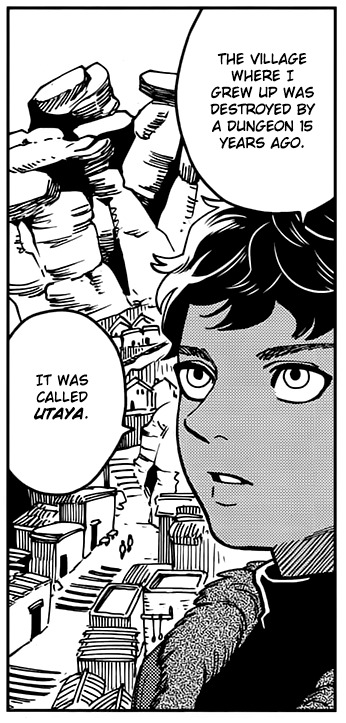
This image of Utaya could be showing us a village built on a mountainside. The house shapes seem a bit more Middle Eastern than Nepali/Indian, but it’s not a detailed drawing and the roof styles are a mix of flat and peaked.
CULTURE
In the Daydream Hour sketchbook, Ryoko Kui included a small comic about characters sharing desserts from their home countries. A young Kabru is shown enthusiastically trying to share an unnamed sweet, and he is interrupted by his elven foster mother, who insists he present a type of elven cake instead. We know that Kabru hates this type of cake, and he seems disappointed to have to eat it and talk about it.
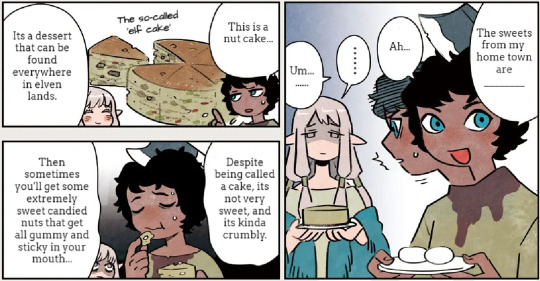
The white balls in Kabru’s dessert are very likely meant to be an Indian sweet called rasgulla (literally "syrup filled ball"). Rasgulla are a dessert popular in the eastern part of South Asia, made from ball-shaped dumplings of chhena dough, cooked in light sugar syrup. While it is near-universally agreed upon that the dessert originated in the eastern Indian subcontinent, the exact origin is disputed. Rasgulla are as culturally important to the Bengal and Odisha regions of India as Parmesan cheese is to the region of Parma in Italy.
Rasgulla are also popular in Nepal, where they are called rasbari.
KABRU’S PHYSICAL APPEARANCE

Kabru is one of several characters in Dungeon Meshi with clearly non-European features: he has brown skin and thick black/dark brown curly hair. He has almond-shaped eyes with long, dark lashes (fans like to joke that he’s wearing eyeliner). All of these are traits common to people from the Indian subcontinent. His blue eyes are not common for someone with his skin/hair color, but blue or green eyes are not unheard of in that region either.
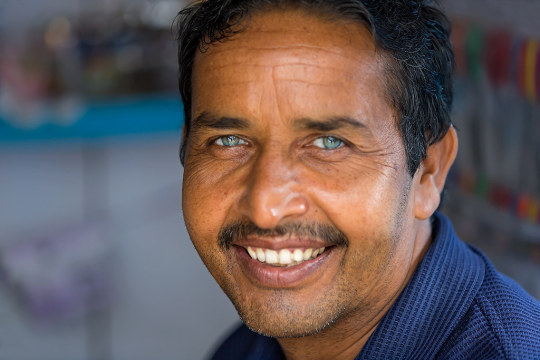
(Indian man with blue eyes)
Blue or light eyes are often a cause for discrimination, like what Kabru experienced as a child. More on this in a moment.
Kabru is 5’7” (170cm) tall, which is short for a Northern European man (180), tall for a Nepali man (162cm), but close to the average height of Indian men (177cm). He has a slender build, which is also common for Asian people in general, and South Asian men in particular.

Compared to the European-looking tall-men in Dungeon Meshi (such as Laios, Falin, Delgal, Marcille’s father), Kabru’s facial features look more like the other Asian characters, such as Toshiro and his party.
CAN DARK-SKINNED PEOPLE HAVE BLUE EYES?
Yes. Light-colored eyes are very uncommon in parts of the world where most people have dark eyes, since dark eyes are a dominant trait in real-world human beings. That means that in order for two parents with dark eyes to have a child with light eyes, both parents need to have a recessive light-eyes gene (or for there to be an illness or genetic mutation), and that’s rare in populations that don’t have a lot of light-eyed people to begin with.
THEN WHY DO SO MANY DARK-SKINNED CHARACTERS HAVE BLUE EYES?
Anime and manga often give characters with dark skin light colored eyes instead of allowing them to have brown or black eyes, which is much more common in real life. It’s a hurtful design trope that makes many readers feel that their natural dark eyes are somehow ugly or inferior to blue eyes.
This trope is used over and over again by authors who want their characters to look “cool” and “exotic”, and for their eyes to be high-contrast to make it easier to show their emotions.
I don’t think this is what Ryoko Kui is doing in Dungeon Meshi.
UNREALISTIC HAIR AND EYE COLOR COMBOS IN ANIME
In a lot of anime/manga, blue eyes (regardless of skin color) don’t actually mean anything in the narrative, in the same way characters having green or pink hair doesn’t mean anything, the colors are non-diegetic, they don’t actually exist in the world, like the music that plays in the background without an on-screen source.
It’s an artistic shorthand to make characters visually stand out, instead of giving them all black hair and eyes like most real-life Japanese people… Which is what most anime/manga characters are meant to be: Japanese people.
Dungeon Meshi has a large cast of characters that are explicitly meant to be non-Japanese. We know this because there’s a group of characters that are Japanese, and they’re drawn differently from everyone else, they wear ethnically Japanese clothing, and have ethnically Japanese names.
Unlike other series, where eye and hair color don’t mean anything, Dungeon Meshi has no unrealistic skin, hair, or eye color combinations.
(Except for the elves, who seem to have different genetics than real world-humans. I’ll get into that another time.)
Ryoko Kui must be aware of the dark skin, blue-eyes design trope, because if she gave Kabru blue eyes just because she thought it looked good, surely she would have made some of the other Asian or dark-skinned characters have light eyes. Out of 9 Asian or dark-skinned tall-man characters, Kabru is the only one with blue eyes.
Kabru having light-colored eyes is central to his story, and Kui talks about it.
KABRU’S STORY AND WHY HIS BLUE EYES MATTER
Kabru’s father and his family tried to kill Kabru when he was born because he had blue eyes. Kabru’s mother ran away, and ended up raising Kabru by herself in Utaya. She didn’t try to return home to her own birth family, but instead struggled to raise a child completely on her own with no money or support, which implies she had no other options, due to the fear people of their region have for people with blue eyes.
This is a real thing that used to happen frequently in areas where most of the population has dark eyes, and it still happens to this day.
In a realistic story, this is logically what would happen to a character with dark skin born with blue eyes in a place like the Utaya region. It’s rare for manga or anime to show dark-skinned blue-eyed characters facing this.
WHAT IS THE “EVIL EYE”?
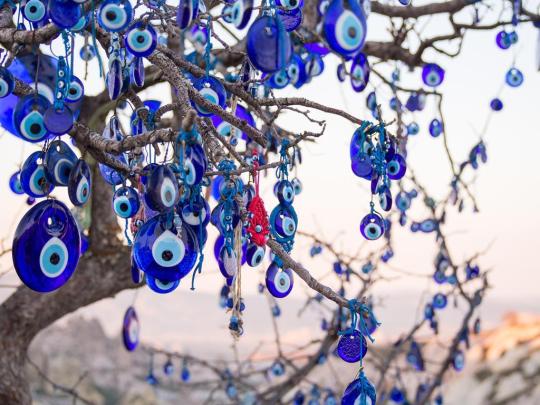
The “evil eye” is a supernatural belief in a curse brought about by a person looking at you. The belief in the evil eye has existed since prehistory, as long as 5,000 years ago. It is estimated that around 40% of the modern world's population believes in the evil eye. This concept is most common across the Mediterranean, the Balkans, the Middle East, and Central and South Asia, areas where light-colored eyes are uncommon.
In areas where light-colored eyes are rare, people with green eyes, and especially blue eyes, are thought to bestow the curse, intentionally or unintentionally. Just one look from a blue-eyed person is often considered enough to inflict a curse.
One of the most famous and widespread talismans against the evil eye is the nazar, a glass amulet featuring concentric circles in dark blue, white, light blue and black. It’s supposed to “bounce” the curse away from the wearer.
HOW DOES THIS APPLY TO KABRU?
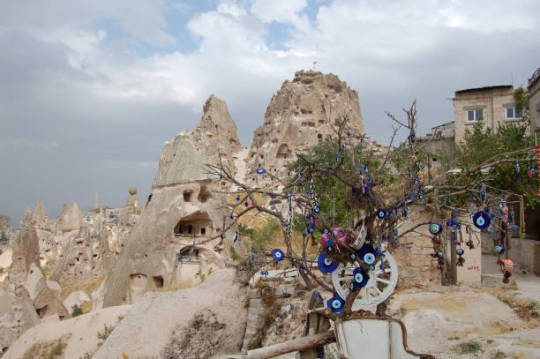
Imagine Kabru growing up in a village surrounded by people wearing and hanging talismans that look like his eyes, because the people around him think blue eyes are evil. They call his mother a witch for birthing him, and a whore because she doesn’t have a husband. Imagine parents forbidding their children from playing with or even talking to Kabru. People crossing the street to get away from him, or chasing him away by throwing rocks.
I think the reason young Kabru was able to learn how to speak some kobold is likely because he was so heavily ostracized by the other tall-men around him, the only children he could occasionally interact with in Utaya were kobolds, who might not share the same cultural superstitions that the tall-man do.
This childhood trauma, combined with Kabru’s experience of the dungeon collapse in Utaya, and being raised by an elf that treated him more like a pet than a human being, set Kabru up as a character who has never had a home where he belongs. He has been an outsider from the instant he was born, and every place he has lived treats him as an “other.”
To his father’s family, he was a curse. To his mother, although she loved him, he was a burden. To the people of Utaya, he was a monster. To the elves, he’s a tall-man baby (no matter how old he gets) with funny looking eyes, to the people on Merini Island, he’s a foreigner from the West with elven ways and education.
CONCLUSION
I wanted to write this because I know some people will see Kabru in the anime for the first time today and think "Oh, another dark skinned blue eyed character! This is a bad character design that is evidence that the author is racist at worst or ignorant at best.” And I don’t think that’s a fair assessment of Ryoko Kui’s work in Dungeon Meshi.
This isn’t to say that Ryoko Kui has never done anything wrong, or that her work couldn’t be more inclusive, or that there’s no way in which she could improve.
But there are pages and pages of artwork she’s done that shows she cares about these issues, and I think it’s worth celebrating when someone makes that kind of effort with their artwork.
ANYWAY…
If you’ve read this far, you’re very strong hahaha. I hope you enjoyed this essay. I’ll be publishing more soon when I finish my Dungeon Meshi research on the names and cultures of all the characters. Wish me luck!
#dungeon meshi#delicious in dungeon#dunmeshi#kabru#my stuff#analysis#character of color#theories#Dungeon Meshi Research
2K notes
·
View notes
Text
A (Negative) Analysis of Tom Taylor's Nightwing Run - Introduction
Introduction Who is Dick Grayson? What Went Wrong? Dick's Characterization What Went Wrong? Barbara Gordon What Went Wrong? Bludhaven (Part 1, Part 2) What Went Wrong? Melinda Lin Grayson What Went Wrong? Bea Bennett What Went Wrong? Villains Conclusion Bibliography
I want to start this essay by admitting I’m actually embarrassed by its length. Why did I spend so much time on something I dislike? The truth is, I did not begin this with the intention of creating such an extensive, formal study of the Tom Taylor and Bruno Redondo’s Nightwing run and how it reflects the wider problems with DC’s handling of one of their most iconic characters. I was just trying to organize the thoughts that came up during discussions with other Dick Grayson fans. Before I knew it, I had enough material, enough desire to challenge myself, and enough frustrations to vent to properly create this monstrosity.
I did not begin this Nightwing run determined to hate it. In fact, I was ready to love it. As Taylor promoted the run before the first issue was officially released, I was so excited for it. As I read short interviews where he discussed Heartless, I could not wait to have a new, incredible villain. Foolishly, I believed Taylor when he said he loved Dick Grayson.
Needless to say, I was disappointed. Then frustrated. Then angry. The beginning of any story is a period where writer and reader form an indirect bond, and as the story progresses, so do the highs and the lows of said relationship. As such, a reader’s tolerance for negative factors will either increase or decrease depending on their experience up until that point.
In other words, if the writer fails to earn the reader’s trust and instead takes their attention for granted, even seemingly insignificant details become irritating in a way they would not be if presented in a better story. In such scenarios, the reader can no longer overlook those minor moments because there’s little good to balance them out with. It is a death by a thousand cuts.
In the case of Taylor and Redondo’s run, along with those thousand cuts are also broken bones, internal bleeding, head trauma, and severed limbs. A weak plot, simplistic morality that undermines the story’s stated themes, and, most importantly, a careless disregard for Dick Grayson and everything he stands for utterly destroyed my enjoyment of this series.
It is still too early to tell what sort of impact Taylor’s (as of time of writing, still unfinished) run will have on Dick Grayson’s future portrayals. But just because we cannot predict its long term significance, it does not mean we cannot critique it. Currently, we simply lack the benefit of hindsight.
If this essay were to have a thesis, then it is this: Tom Taylor and Bruno Redondo’s Nightwing not only fails to tell a compelling Nightwing story, but it also exemplifies a cynical, self-serving, and shallow approach to storytelling that prioritizes creating hollow viral moments to boost the creators’ own online popularity over crafting a good story, honoring the character in their care, and respecting his fans – fans who have, historically, often been women, queer folk, and other individuals who felt othered by a cisheteronormative patriarchal society. Taylor and Redondo’s thoughtless and superficial narrative not only undermine the socially progressive ideals they supposedly care for by propagating a cisheteronormative patriarchal worldview, but they also demonstrate a lack of love and understanding for the character in their care. At best, Taylor and Redondo have no interest in getting to know Dick Grayson, nor any respect for their predecessor and their contributions to this character. At worst, they despise Dick so much that they wish to reinvent him into something completely different, tossing away everything that was special to his fans in order to appeal to a readership that never cared about Dick Grayson.
I structured this essay so that, hopefully, each part will build on the ones that came prior. Naturally, because all aspects of a story are interlaced, there will be overlaps between each of the sections. As it may have become obvious from this introduction, I’ll be focusing primarily on the writing of this run. That is not to say that I will not address the art, but writing is the field I know most about, and so it feels only fair to focus my critique on that.
I hope that by the end of this essay, I will have successfully proved that this run’s mishandling of different narrative elements betray a cynical appropriation of progressive ideology and a disregard and disinterest in what makes Dick Grayson so special to so many people. This is an attitude that is present within DC Comics’ current ethos as a whole.
Now, who is this essay for? Honestly, it’s probably not for Tom Taylor fans. I do not believe I’ll be persuading anyone with my writing, and, to be quite honest, neither would I say I wish to do so. Taylor and Redondo’s run has won numerous awards and has many dedicated fans who adore it for what it is. If that is you, then I’m glad. I wish I could be among your numbers. I wish more than anything that I could love this story. But I do not, and I know many others agree with me, and it is to them, I think, that I’m speaking to. As Taylor’s run is praised to heaven and back, I needed a safe space to voice my thoughts. This essay became this safe space. And to others who also feel unseen by the constant praise this run is getting, I think this could speak to you, as well. To be cliche and cringe, this will hopefully let you know that you are not alone.
Finally, I want to acknowledge some people whose thoughts greatly contributed to the creation of this essay. For around three years now I’ve been having wonderful interactions with other Dick Grayson’s fans, and those discussions were not only incredibly fun and cathartic, but also provided great insight into what needed to be included in this essay. My best friend especially gave me a space to vent when I got frustrated, and my original outline borrowed a lot from the messages I sent her, as well as notes I took for our discussions.
I’ll also be directly quoting four different Dick Grayson fans (identified as Dick Grayson Fans A, B, and C in order to allow them to keep their anonymity). Their analyses were so critical to the formation of my thesis and for a lot of what will be addressed in this essay that I actually feel like they deserve co-credit in this essay. Dick Grayson Fan B especially deserves a shoutout in helping me track down a couple of pages used as supporting evidence, as I knew what pages I was looking for but was having a hard time remembering in which issue they were located. I’m quoting them with permission, and crediting their ideas and contributions whenever relevant.
Now, without any further ado, let’s get started.
729 notes
·
View notes
Note
Hey, can you do a Fiyero x reader where the reader doesn't trust people much and he likes her and helps her trust people?
No One Mourns The Wicked
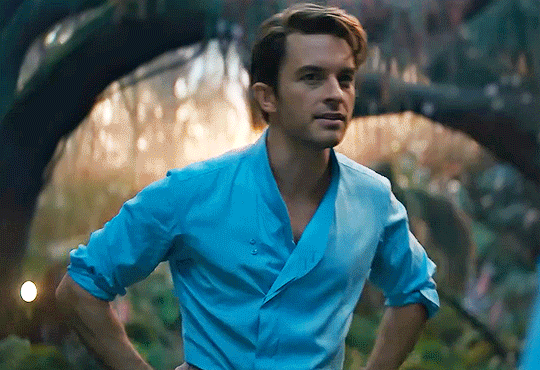
Fiyero Tigelaar x Reader
A/n: I had to revise this several times because I was not happy with it, so I hope you like it! I took some inspiration from scream and to all the boys I loved before, so if you know you know. I also continued with the theme of having song titles because I’ve been listening to the soundtrack 24/7 :)
It wasn’t easy to trust people. Especially after what happened a year ago. Trusting people meant to let them in and let them see the real you. It was a beautiful thing. But trusting people also made it easier for people to take advantage of you and betray you.
Before the incident it was easy to let people in. You let people in quite often because you enjoyed the concept of meeting new people and getting to know them on a personal level. Now having your walls up has become second nature and it’s hard to go back to the way things used to be. So now you keep everyone at an arms distance and only interact when necessary.
Life was fine that way. You were still very close with your family and they respected your new choice of living. But no one outside of your family gets to discover the real you.
You were actually glad when you received the news, one early morning, that Prince Fiyero Tigelaar of Winkie Country had just arrived at Shiz. You knew that everyone would be too preoccupied with him to notice you, so it was the perfect way to avoid people.
If you saw him anywhere near, you would walk the in the opposite direction in order to avoid people. And it worked. But that didn’t mean you never thought about him.
He seemed like he was fun to be around. Carefree and oblivious to the tribulations of the world, but at the same time still being aware. He would be someone you would have been friends with before what happened.
Sometimes you wish you weren’t the way you were. You wish you could just walk up to him and strike up a conversation. Younger you definitely would have been able to. Now you just sit by and watch and only imagine what it would be like to interact with Fiyero Tigelaar.
What you didn’t know was that he was intrigued by you as well and he was determined to get to know you.
—————————
You were currently in the library writing an essay for literature. It was your best subject and you always received perfect scores, but your mind wasn’t there at the moment. You knew that you would get nowhere if you kept pushing yourself, so you set your essay aside and decided to read a book.
You left your belongings where you sat and went to a nearby bookshelf near the fantasy section. You found the title of the next book from the series you were currently reading. It was pretty high up so you had to stand up on your tip toes.
Your fingers grazed the spine of the book and then suddenly a hand came from behind and grabbed the book from the shelf. You turned around and it was the man himself. The one no one could stop talking about. Fiyero Tigelaar.
This was the first time you’ve ever been in such close proximity with him. You’ve never realized that his eyes were crystal blue until now. You being the person who never interacts with people waited for him to say something first.
“You’re Y/n right?”
You nodded.
“I’ve seen you around and never properly introduced myself. I’m Fiyero Tigelaar,” He paused for dramatic effect, “of Winkie country.”
“I know.”
You plucked the book from his hand and walked back to your chair. Fiyero ran after you and stopped you from getting back to your seat.
“How come I only see you in class and rarely around campus?” He asked.
You were taken aback by his words. You didn’t even know he knew you existed let alone kept tabs on you about where you were.
“I like to keep to myself.”
You walked past him and sat back in your seat. You opened up the book and began to read the first page. Suddenly, you heard the chair across from you scrape and somebody sat down it in. Very slowly the top of your book was pushed down by a finger and you looked up to see Fiyero.
He sat there, with the chair facing the opposite direction that it should be, looking dare you say, devilishly handsome. The corner of his lips pointed upward in an endearing smile.
Younger you would have come up with some witty remark to say, but you now drew a blank at what words to choose from. Feeling like a fish out of water when interacting with others.
“You don’t talk much do you?” He pointed out.
You shook your head.
“Why is that?”
His head tilted to the side like a puppy and you wanted to point it out, but you were too afraid to.
“Because I want to.” You said.
“Because you want to. No there has to be more to it.”
“There isn’t.”
Fiyero sat there for a moment before speaking again.
“I don’t really see you interacting with other people much. It’s as if you socially isolate yourself on purpose. Why are you so antisocial?”
This guy doesn’t try to allude to anything you thought. He just says whatever pops into his brain.
“I’m not antisocial.”
Fiyero gave you a skeptical look, but then suddenly you could see the gears turning in his head, while thinking about what you just said. He leaned forward in his chair and talked quieter.
“You don’t trust people do you.”
That sentence caught you off guard. No one has ever been so blatantly blunt with you until now. Even though you keep to yourself you actually are an open book, and anyone would get to the point Fiyero is right now if they cared enough.
Even though you never voluntarily interacted with others you secretly wished that someone cared enough to get to know you. But now that you finally got what you wished for, you didn’t know what to do.
You felt like a deer caught in headlights. You can hear the answer in your head as clear as day, but putting it into the words was the issue. The words were coherent, but they became jumbled as soon as you tried to speak.
So you did what you did best. You avoided people. In this case you avoided Fiyero. You stood up and began to grab your belongings.
Fiyero’s smile began to fall from his face.
“Did I do something wrong?”
But you ignored him. You grabbed the rest of your belongings and began to speed walk towards the exit of the library, when you felt a hand grab your wrist.
You looked up at Fiyero and he had guilt written all over his face. It made you feel guilty for acting the way you did.
“If I said anything to offend you then I’m sorry. I only wanted to get to know you better. I’m sorry if my questions came off as rude. I was just nervous and I really wanted to make a first good impression and—“
You didn’t let him finish and you yanked your hand free from his hold. Without another word you walked out of the library and you didn’t look back.
You felt his eyes on your back and you could have sworn you felt his regret and disappointment all the way down the courtyard.
—————————
For the rest of the week Fiyero kept his distance from you and you were grateful for it. It’s like the way things were before, but now whenever you two came across each other he would either smile or nod at you. A way to still interact you, but not so direct and it gave you time to think about what you could possibly say to him.
You felt guilty about the way you treated him the other day and it’s been eating you alive that you caused him pain. You didn’t mean to be rude, but you just didn’t know how to explain to him why you are the way you are. It meant opening up to him. Trusting him. And that’s something that you haven’t done in a long time. You forgot how to trust anyone.
You tried to come up with different scenarios in your head on how you could confront him. But you knew deep down that you could plan on what to say, but you woundn’t know how to set your plan into motion. As of right now you had nothing
So you tried to write down your thoughts in a letter to say you’re sorry for the way you acted, but you could barely write two sentences before crumbling the paper up and throwing it in the trash. All of your drafts seemed too impersonal.
And when you weren’t trying to write an apology letter, you often thought about the last few words he said: “I was just nervous and I really wanted to make a first good impression and—“
What did he mean by that? From the outside he looked calm, cool and collected. He never gave off the impression he was nervous, so why would he be nervous with you? And why would he want to make a first good impression with you? It’s not like you are someone important.
But you tried not to dwell on it too much because you still had assignments, exams, and projects that needed to be completed and that was stressful enough.
One day after a stressful exam you decided to find solitude in your hiding place. There was a forest near campus you went to whenever you needed to clear your head or simply be alone.
Today you simply wanted to draw, something you did quite often, and you thought what would be better artistic inspiration than the forest you always go to.
You found a clearing with a pound and used a nearby rock as a seat. You began sketching the outline. You started with the lake and then moved on to make roughly shaped trees. You can get more detailed with everything once the layout is sketched out.
You found it quite peaceful to be alone and content with the only sounds being the ripples of the water and the animals and bugs in the forest. You were shading the edge of the flower you drew with a shading tool, to create a shadow, when you heard a twig snap. Your head snapped to look at the intruder and it was the last person you expected to see.
Fiyero.
All the guilt you’ve been feeling came crashing down like a tidal wave. You didn’t think you would see Fiyero right now. You thought he didn’t know this place existed. You weren’t prepared and you had no idea what to say, so you just stared at him.
Fiyero said nothing either and he took a seat on the rock next to you. You continued to stare at him as he picked a flower from the ground and began to pluck the petals off. With every other petal he said.
“She’ll talk to me.
She won’t talk to me
She’ll talk to me
She won’t talk to me.”
Finally the last petal.
“She’ll talk to me.” Fiyero said with wink.
You looked away from Fiyero and down on the ground because you didn’t want him to see your blushing face. The grass looked very interesting all of a sudden. You began to pick out the spades of grass.
“You don’t have to say anything to me right now. We can just sit in silence if you would like. But over time I want to get to know you little by little. I know I have to gain your trust, and I’ll wait as long as it takes for you to trust me.”
You looked up at him and noticed his eyes softened. You tried to read them and they gave a sense of acceptance and comfort.
He accepted the fact that it would take a while to break down the walls you built around yourself, but he’ll wait. His presence alone felt like a warm blanket being wrapped around you.
Without realizing it, tears began to well up in your eyes. Although you gave off the impression of wanting to be alone, all you along you wanted someone to approach you and put in the effort to get to know you.
You haven’t had a basic human connection in so long and you’ve longed to feel that way again. To feel like a piece of you was missing, but when you were together with that special person you felt whole. That missing piece finding its rightful place in your heart. You haven’t felt that way in a long time.
Not until now.
You felt something soft land on your hand that was to the side. It was Fiyero’s hand. He flipped your hand so that your palm was facing upwards and he interlocked your hands together.
You looked back up at Fiyero and he was already looking at you with a warm smile. It made you feel dizzy and odd in the best way possible. You felt that leap in your heart that you never thought you would feel again. It caused a tear to finally slip from your pooling eyes.
Fiyero chuckled softly before using his other hand to wipe away the stray tear from your cheek ever so gently.
“No one has ever took the time to learn more about me.” You said with a small smile.
Fiyero brought your interlocked hands to his lips and kissed the top of your hand.
“Well then let me be the first one to do so.” He said with a gentle, comfortable smile. Fiyero turned to the sketchbook that was sitting on your lap.
“What are you drawing?” He asked.
You could tell he wanted to say something more. There was something left in the air that was left unsaid. You knew what he was doing and you were grateful for it. He wanted to get to know you, but he was starting with something small, which was your sketchbook. Nothing too personal, but big enough to create an opening for something more.
You looked up at the pond in front of you and pointed at it as a way to answer Fiyero’s question. He seemed to understand. He looked between the pond and your drawing and a smile spread across his face from ear to ear.
“You are very good!” He exclaimed, “your drawing looks like an image!”
“Thank you.” You said quietly.
“You’re welcome.” Fiyero was satisfied that he got you to start talking to him. Even if they were a few words at a time. He would wait.
And he did.
—————————
Over the next few weeks Fiyero did his best to intertwine himself into your life, but without stepping on your toes too much. He was usually the one to approach you, but now you didn’t shy away and you enjoyed his company.
Most of the time the two of you sat in silence and Fiyero didn’t mind it. It was a change from the noisy and boisterous life he was used to, but he enjoyed it.
Spending time with you was like escaping from his exciting life. He always felt like he had to put on a show for others, but with you he could just be himself. He could just be plain old Fiyero. And that made him very happy.
As time went on you began to open up to him little by little the more time you spent with together. He would often acompany you in the library or your dorm room whenever you were studying or he would be following you to the forest where you would draw.
Your simple nods become smiles, and your quick words became sentences. And the other day you laughed for the first time in front of Fiyero and it was music to his ears. Day by day Fiyero began to start seeing the real you piece by piece and he was longing to know more. (At your own pace of course).
As you started to open up to him more, you began to trust him. The first person you ever trusted ever since the incident and you couldn’t help, but feel proud of yourself. With the help of Fiyero’s constant presence you were able to let someone in and that’s an accomplishment in itself in your eyes.
One day, when Fiyero and you were siting on your bed, he cautiously asked you what has been on his mind for awhile. Why do you not trust people?
You answered with, “Cause the more people you let into your life, the more that can just walk out.”
Fiyero wanted you to elaborate, but he could sense your sadness, so he didn’t push any further. However, you trusted him enough to share with him about what happened to you. Why you became the way you are. So you did.
You explained how you were dating a guy named Charlie and shortly after, out of nowhere your grandma got sick with an illness. She died within a month.
Your grandmother was like a second mother to you. She helped your parents raise you and has been by your side for all your life. Loosing her was like losing a piece of yourself. A piece that you can never gain back.
At first Charlie was understanding about your grief, but then over time he grew bored with you. He felt like you were being a prude for not giving him what he desired from you and you tried to explain to him that that was the furthest thing from your mind (you were still grieving), but he didn’t listen.
So he turned to someone who would give him what he wanted. Your best friend.
To say you were heartbroken was an understatement. The one person you thought you could trust the most in the world betrayed you in the worst way possible with your best friend, another person you trusted. Your heart was broken in more ways than one and there was no way to heal the opened wound.
You could barely grieve for your grandmother when your heart was split in two from the cheating and the break up. You couldn’t bear to feel anymore pain, so you began to block people out.
It was easier to dull the pain when the people who caused it weren’t it, so to prevent it from ever happening again, you made sure no one else was in your life.
Fiyero listened whole heartedly to every word that left your lips and processed what was being said. He felt immense anger towards your ex-boyfriend and ex-best friend. How could they do that to you? To someone who was so gentle and pure of heart. If Fiyero ever crossed paths with either one of them they would wish they never met him.
But at the same time he felt immense pride and gratitude. He was proud of you for still standing strong after what happened to you and he was grateful that you trusted him enough to share your story. Trust that he wouldn’t take for granted.
Fiyero grabbed your hand that was sitting in your lap and pressed a kiss to the back of it.
“I’m glad you feel comfortable enough with me to share what you just told me. I know it took you a lot of strength to get where you are now and to relive it once again as you told me.” Fiyero cleared his throat. “There’s something that my mother always used to say to me. She would say, “Goodness knows the wicked’s lives are lonely. Goodness knows the wicked die alone. It just shows when your wicked your left only on your own.”
He gave you a moment to let the words sink in.
“No one mourns the wicked and you are not wicked. You are the opposite of that. You are the sunshine that creeps in from the clouds. You don’t deserve to be alone or feel lonely because then you’ll die alone. They are the ones who deserve that, so don’t let them win. You’re mourning everything that you had when you should be living in the present. If you continue to go down this path then they win.”
And ever since that day you’ve lived by his words. It didn’t happen overnight, but over time you became more open with others around you and you found yourself having a few acquaintances. They weren’t friends now, but you can see yourself becoming friends with them in the future.
Your trust in people wasn’t the only thing that evolved. A few weeks after you and Fiyero’s talk on your bed, he asked you out on a date and you said yes. Now you two are in a relationship and are still going strong.
Fiyero is the best boyfriend you can ever ask for and especially today. He knew how stressed you were lately with finals coming up, so he decided to surprise you with a shopping day out on the town. It was exactly what you needed after these stressful past couple of weeks.
You both were currently at a clothing store and you were looking at different dress options, while Fiyero went off to get something for his mother. You were feeling the fabric of a pink dress when you heard someone say.
“I love your shirt.”
You turned around and was face to face with a girl your age. You recognized her from Shiz. You shared a few classes with her and sometimes you would see her in the library when Fiyero was distracting you from studying.
Talking to people again was still new to you, so you couldn’t find the right words say. You pointed at your top to ask if she was talking about your shirt and she nodded.
“Yes your top! It’s really pretty! Where did you get it?!”
Then you managed to find the words that were swimming through your mind.
“I uh…I actually made it.” You said bashfully.
The girl looked stunned.
“Really?! How.”
“I crocheted it.”
“That’s really impressive. I wish I had the gentleness to do something like that. My hands are NOT meant for such tedious things.”
“It’s actually not that hard. Of course for a beginner it might be difficult, but once you get the hang of it it’s not so bad.” You replied.
You had no idea how you managed to gather the courage to continue talking to her, but somehow you were doing it. You two broke into a lovely conversation and you two were in your own little world.
Fiyero had just finished paying at the register, so he turned around to go look for you and he found you in the dress section talking to a girl!
You’ve been more open with people lately, but you always had the protection of Fiyero with you so you could feel a sense of support. This was the first time he saw you engaging with someone on your own and he felt proud of you. With a smile adorning his face he walked up to you and the girl.
“Hello ladies.”
“Hi Fiyero. I’m going to let you two be.” The girl said and she turned back to you. “It was so nice talking to you. Maybe we can hang out soon!”
“I would like that!” You said.
“Great!” The girl, which you found out was named Grace, gave you one last smile before walking out of the store.
“She seemed nice.” Fiyero said.
“Yeah she was.”
Fiyero slowly walked up to you and brought you into a hug. He rested his head on top of yours and quietly whispered in your ear, “I’m proud of you.”
You smiled and said I know. That caused Fiyero to chuckle and he pulled away, so he could look at your face.
“I got you something.” He said as he handed you a plastic bag.
“I thought you got something for your mom.”
“I might have lied.” Fiyero said with a smirk.
You playfully punched him in the arm and curiously grabbed what was in the bag. In your hand was a small velvet square box. You gave Fiyero an arched eyebrow, but he only prompted you to open the box.
You slowly opened it and inside was a necklace. It had a gold chain and at the center was a sun charm. It was shiny and it had different hues of orange and yellow. It was beautiful.
You instantly knew the meaning behind it. Lately he has been calling you sunshine because he believes that you are the sun that lights up his day. The first time he called you sunshine your cheeks turned into a tomato, so he’s been using that nickname any chance he could.
“Fiyero…” you didn’t know what to say. Fiyero grabbed the box from your hands and carefully took the necklace out of the box. He told you to turn around and you obliged. His arms went in front of you and he wrapped the necklace around your neck. Once it was clasped you turned around and Fiyero was looking at you like you held the sun in the sky.
“Now you can shine your light on everyone sunshine.” He said with a smile.
You instantly wrapped your arms around him and he reciprocated your actions. He placed a kiss on top of your head and smoothed out the knots in your hair.
“No more mourning.” Fiyero said.
You looked up at him.
“No more mourning.”
In that moment the old you disappeared.
“Now at last she’s dead and gone
Now at last there’s joy throughout the land.
No one mourns the wicked.”
#wicked film#wicked fiyero#fiyero tigelaar#fiyero tigelaar x reader#prince fiyero#fiyero x you#jonathan bailey
331 notes
·
View notes
Text
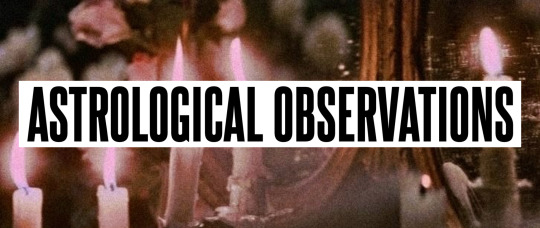
* GENERAL OBSERVATIONS, PART THREE.

ASTEROIDS & CELESTIAL BODIES

ASTEROID ORPHEUS (3361) CONJUNCT CHIRON may represent one who looks to their past for creative inspiration. They’ll often use their preferred form of art in an attempt to understand traumatizing events or process any emotions that may still linger.
ASTEROID APOLLO (1862) in the 8H could signify an individual who enjoys creating or consuming media about controversial and dark topics.
When I see ASTEROID PANDORA (55) in the 10H, I immediately wonder whether the individual with this placement has experienced some sort of chaos or crises regarding their public image. Maybe they’ve had traumatic experiences with their main circle of friends, or maybe they’ve even received some level of backlash on social media for a flawed interaction. Whatever these natives have endured, they probably yearn to control public perception of their character in an attempt to prevent misunderstandings.
Check which house ASTEROID ARISTOTELES (6123) is located in within your natal chart to find where you crave the most knowledge and wisdom! As an example, I have my Aristoteles asteroid in the 8H of transformative experiences, death, and “taboo” topics — and I’m now a practicing divination witch who enjoys paranormal investigation.
Due to difficulty with turning intuitive ideas into real achievements, 9H CHIRON individuals might find the process of outlining an essay or project to be particularly challenging. They’re the types of students who change their thesis a bunch of times before a paper’s due date.

PLANETS IN SIGNS & HOUSES

SATURN 1H placements might have people pleasing tendencies at some point in their lives due to a fear of never meeting others’ expectations.
SAGITTARIUS SATURNS likely grew up in households where one or both parents was strict and / or religious. The challenge awaiting these folks in life is to pursue exploration of knowledge outside of what was taught to them in their youth. They probably enjoy philosophy or history, and could possibly grow up to be spiritual but not religious.
LEO MERCURY placements, was your writing style ever described as “flowery” by your teachers or fellow students before? Because this placement TOTALLY gives me the vibes of a flowery and dramatic writing style.
One could theoretically use their JUPITER placement to discover two things: 1) The field of study where they have experienced the most growth throughout their academic career and / or 2) their best academic subject. To do this, look at Jupiter’s degrees and house. I have CANCER JUPITER placed in the 9TH HOUSE in my chart, and I absolutely adore law, history, and philosophy! However, I’ve had to undergo the most growth in Cancerian concepts such as life skills in the home and actively listening to others.
CAPRICORN JUPITERS are prone to having a “the end justifies the means” philosophy when it comes to achieving their goals. They also might struggle with perspective taking / putting themselves in others’ shoes, particularly when they perceive the individual in question as someone outside of what they consider “normal”.
6H MOONS strike me as the type who love being around animals MUCH more than they love being around people, especially if the majority of their personal planets are in a water sign.

ASPECTS

SUN SQUARE URANUS indicates memorable students whose teachers / professors will remember them for many years to come.
Hard MERCURY-PLUTO aspects could struggle with maintaining a consistent routine for studying, especially if Mercury is in retrograde in the chart.
MERCURY TRINE JUPITER placements LOVE yapping in class, but it’ll either be with their peers while the teacher is talking or by frequent class participation. If you’re the class participation type, you’ve probably had a teacher say “does anyone OTHER than (your name) know the answer?” before 😭
Although this placement does make for great activists who are not afraid to call out injustice when they see it, LILITH CONJUNCT MERCURY folks NEED to prioritize being tactful due to a natural tendency to bluntly say whatever’s on their mind with no filter.
SATURN-NEPTUNE aspects need to practice intense discernment when it comes to politics — fact check everything and don’t just believe everything you see / hear on the internet or news without taking the time to research it for yourself!
Hard ASCENDANT-SUN aspects tend to be noticeably different people in public versus private spaces. Your first impression of them will likely be VERY different from the truth of the person that they are behind closed doors.
MIDHEAVEN OPPOSITE VENUS placements are amazingly creative individuals whose art may play a major role in their own identity, but they simultaneously might have a major fear of sharing that art with others. Peer review in class is an absolute NIGHTMARE for them.

#astrology observations#astro community#astro observations#astro notes#astrology#* astrology#asteroid#lilith#black moon lilith#astrology aspects#saturn#capricorn#sagittarius#academia
227 notes
·
View notes
Text
The reasons why I think Stella and Bloom's friendship is amazing and is not something we often see
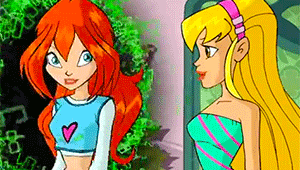
Or why Fate is trash
One aspect of Winx club I always loved growing up was the friendship between the girls. They all love each other, despite their very different personnalities and having some rough times.
While I could write an essay about almost every duo in Winx club, I do think that Stella and Bloom are the most interesting to analyze.
Even though they are part of a friend group, the show doesn't try to hide the fact that Stella and Bloom are each other best friend, they even say so themselves.
This friendship is truly groundbreaking when we think about it, for one simple reason: Bloom and Stella's archetypes usually hates each other when depicted together in media.
Hear me out.
Stella is the girly girl, the mean girl, the popular girl with a big mouth who can appear shallow. Plus, she's blond. She bases a big portion of her self-worth in her apperance. Basically, she's the Regina George of Winx Club.
Bloom, she's not like the other girls. There's nothing wrong with her, she's attractive and a sweetheart, yet she attracts attention for being different (in the show there are a few reasons for this, first she's from Earth and she's also the keeper of the Dragon Flame, making her a god-like existence in the story). She has messy hair, dresses in jeans, doesn't really care about her apperance... She's a fish out of water type of character, the character everyone can and wants to relate to. She's the Cady of Winx Club.
These two were designed to hate each other.
Taking into account Stella's nature, we expect her to hate Bloom out of sheer jealousy. Bloom doesn't try and gets all the attention, she's the new girl who turns out to be the one girl more powerful than her, she's also a princess. We could say that everything Stella can do, Bloom can do better.
And yet...
Stella would kill a bitch for Bloom. Never in the show does she display any sort of ill feelings toward Bloom, on the contrary, she spends her time trying to get her to be more confident in herself and her abilities. She's sweet with her and does her best to uplift her. I can say with confidence that Stella is the one person in the show who loves Bloom the most (tied with Daphne), like Sky doesn't hold A CANDLE to her.
When Bloom leaves on missions by herself she's worried sick, she's always clinging to her, teasing her, looking out for her. She's always the one there for Bloom when things get hard (when the Trix steal her powers, when Sky gets engaged to Diaspro, when she thinks of her family...)
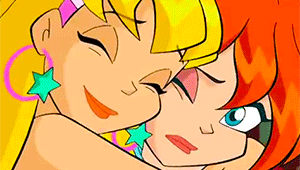
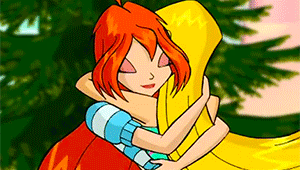
And Bloom, she just loves Stella. She's the reason her dream became reality (it was her meeting with her which caused her to learn her true nature), and Stella took her under her wing to make it easier for her to fit into this new world. She saw from the beggining that Stella was willing to lie for her, to fight for her and she couldn't help but love her, even if she had a big mouth and quite the personnality. Stella brought lightness and laughter into her world, she was her anchor.
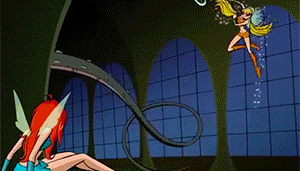
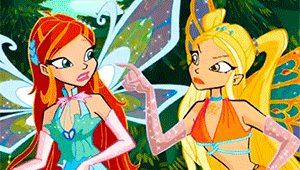
For real, just look at her reaction when Stella throws herself from the cliff in season two. She spends the episodes after that obsessing over finding and saving Stella.
These two can't live without each other even though one is the 'your typical mean girl' and the other is 'not like the other girls'.
Heck, everytime the villains freaking spy on the Winx these two are all over each other.
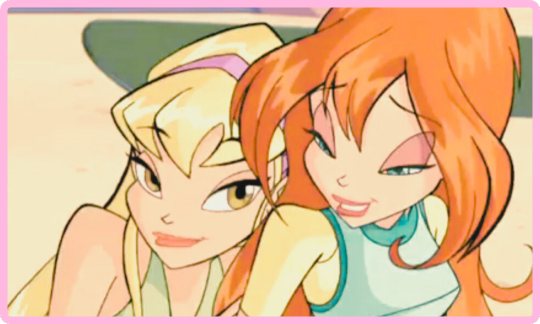
I think the heart of their friendship is their first meeting. Stella was what Bloom had dreamed of all her life: she was a real fairy, the living personnification of her dreams. She's the one who made her dream a reality. As for Stella, she was saved by a human who risked her life and stood up for her even though she didn't stand any chance and didn't know her. Bloom was just lucky she turned out to be a fairy. Bloom then took her to her house and took care of her, without expecting anything in return, which caused them to bond instantly.
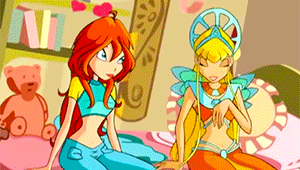
That relationship was freaking transgressive for the time, and Fate's writers deserve jail for what they did to their friendship. Bloom and Stella fighting over a boy and Stella turning into the typical insecure and jealous mean girl? Hell no.



Look at these queens 🥹
#never even watched Fate but I know enough to know it's crap#winx club#Winx#bloom#stella#friendship#fairy#magic#fate the winx saga#love
590 notes
·
View notes
Text
Some thoughts on Mouthwashing ive been having...
the fact that at the end of the game, Jimmy still doesn't understand what he needs to take responsibility for. he thinks its for hurting Curly and crashing the ship when really he needs to take responsibility for a lot more than that, like manipulating Daisuke and assaulting Anya. It's like what Polle says at the end of the game, "If all of that is true... why are you still so concerned with him?" Jimmy is too arrogant and self-absorbed to really even take responsibility at all. Even in his final moments, he shifts the responsibility to Curly, making sure he is the one with the chance of survival by putting him in the pod and calling him "captain", putting him in charge.
After Anya's death, there's the appearance of multiple flowers in areas relating to her, like her grave and the vents. I recognize these flowers - they're actually quite popular in Queensland, where I'm from. I'm pretty sure it's a Hibiscus, with meanings often associated with personal power, fame, and glory. Personally, I reckon this meaning relates directly back to Anya's assault and the power that Jimmy held over her (and also the fame and glory meanings remind me of the fact that women are often seen as prizes to be won, sexual prizes). Flowers in media are also associated with sexual organs or pleasure, and then there's the fact that flowers are pollinated, which just reminds me of Jimmy's assault on Anya and giving her this unwanted pregnancy. the fact that these flowers show up in her section absolutely disgusts me, as it's the way Jimmy sees her, as a flower, weak, fragile, and to be pollinated.
And that whole dead pixel scene with Anya and Curly - I don't see a lot of people talking about that. the fact that Anya was able to see the dead pixel clearly, while Curly couldn't find it at all, symbolizes to me the fact that Anya was fully aware of the monster that Jimmy was and what he was capable of, while Curly was still stuck in his optimistic "a bad action doesn't make you a bad person" rose-tinted glasses.
And then the fact that the only time Anya is mentioned or hinted at after her death is in the form of a womb and a monstrous baby, which looks like the Polle statue. Jimmy truly did not care for her at all. all he can see in her is his own punishment and the consequences of his actions. She is viewed as only her womb, only what is growing inside her, only as an object. and the baby being in the form of a horse for Pony Express shows how he really doesn't view the fetus as a real biological entity, but instead the fear of what could happen to him after the ship arrives at his destination. Jimmy has never cared for Anya. he doesn't view his assault as wrong.
and then when Anyas about to die and she talks about how Jimmy was right, and she should've done this from the beginning, that just makes me feel like he's told her to off herself in the past?? which is just so insane if true
Theres literally so much I could talk about with this game, I could write a whole essay. actually, if anyone wants me to write an essay about this game I absolutely will. but these are just some thoughts I had that I haven't seen many people talking about elsewhere, so I thought id put them here. Anyway, Mouthwashing is an amazing game. Probably one of my top ten now.
If ive made a point you disagree with or want to add onto, let me know in the comments. I'm always up for a discussion!
#mouthwashing#mouthwashing game#wrong organ#curly mouthwashing#jimmy mouthwashing#anya mouthwashing#mouthwashing thoughts#mouthwashing curly#mouthwashing anya#mouthwashing jimmy#daisuke mouthwashing#swansea mouthwashing#mouthwashing swansea#mouthwashing daisuke#mouth washing
266 notes
·
View notes
Text
❝ SO... ASS, T!TS, OR THIGHS? ❞ feat. nagi seishiro

— what’s his preference?
cw + tw. smut, 18+, minors dni, fem!reader, aged-up!characters, extensive amounts of foreplay, titplay, nipple sucking, nagi is a spoiled boy but we love him
notes. i think about this cutie patootie often and how he must be so nice to cuddle with... then i remember he’s huge and i just want him to ruin me <3

if you were to ask him this question straight up, he’d likely say something along the lines of, “eh… i like all of you.” which is pretty typical, but not inherently wrong.
in nagi’s case, he believes that if he can lay his head on it, then that’s more than enough for him.
your ass? a cushion for when he’s lazily slumped over your bed, phone in hand as you’re busy cramming your assignments and writing essays, propped up on your elbows in front of your laptop.
your thighs? his well-deserved reprieve after a long day at practice. he loves arriving home and finding you on the couch, patting your lap and inviting him to alleviate stress. as your fingers tousle through his white fluffy locks, a sleepy yawn escapes his lips, cheek pressed against your soft pillowy thighs as he waits for his dreams to take him.
your tits, however, make him rethink his entire outlook on life. i mean, how could he ever forget the sensation of being squished between your soft mounds as you’re going through your usual ministrations—absentmindedly massaging the nape of his neck and playing with tufts of his messy hair, making him hum in content. he doesn’t even think before using them as his personal stress balls, always subconsciously running a hand to cup a breast through your shirt no matter what he’s doing while laid against you.
whether intending to arouse you or not, this always leads to a breathy whimper escaping in the air, gray eyes looking up to see your lips slightly parted and gaze half-lidded. to nagi’s benefit, your tits are also extra sensitive, especially in his big ol’ hands which cover your chest perfectly no matter the size. they make you shiver as his thumbs press your nipples through the fabric, quickly pebbling at his touch. seeing them harden and poke through the sheer material of your top makes the striker’s mouth water.
“just a taste…” is what he tells you as he lifts your shirt above your chest, but nagi’s greedy. he never takes just what he needs, only caring about wanting more. he spends a good hour simply running his tongue around the stiff peaks, alternating breasts by laving at the valley between them before returning the same attention to the other one. his hands like to knead the tender flesh, even clamp them in his hold and push them together for easier access for his tongue to flick the aroused tips of your nipples.
“your tits are so perfect, angel, i wanna suffocate in them…”
it’s constantly a struggle to sit still when he’s adamantly fondling you. you shudder every time he flattens the wet muscle over your areola before wrapping his lips around the bud. your body clings to his, gripping his shoulders and occasionally pulling on the roots of his hair when he suckles on them like a baby. except unlike a baby, you feel the whole weight of him on top of you, heavy and desiring to sink you deeper in the sheets. the hard mast in his sweats ruts against your thigh.
with the drawn out foreplay, you’re nearly on the end of your rope. you need him to plunge his thick cock in your gooey insides already. you’re surely wet enough for him to slide right in—he’s made sure of that from his languid ministrations.
“sei, please, fuck me already…” you drawl prettily, hiking your knee to coax the hard throb in his pants. he bucks his hips on top of you, groaning low and hoarse, and teetering on the tightrope of self-control.
nagi, whether he realizes it or not, is cruel as he is greedy. he savors your reactions, enamored by the glassy look on your soft features that crinkle every time his mouth meets your beautiful skin. he’s practically on cloud nine, and you must be following him since you’re on the verge of falling apart, and he hasn’t even touched the aching, slick spot sticking to your panties yet.
“c’mon, beautiful, just a lil longer,” he coos, his words all wispy that you’re starting to grow lightheaded. he blows on the shiny trail of his spit along the sensitive expanse of your skin, feeling you squirm under him. lazily resting his cheek on your tits, innocent silver eyes find your teary ones.
“i still need to mark you all up for me, angel. stay still and i’ll make sure you feel so good later when you’re sitting on my cock, okay?” his lips tenderly press the swell of your breasts one last time before branding those dreamy promises into your skin.

copyright 2023 shotoh, all rights reserved. i do not allow my creations to be published or translated anywhere else so please do not repost this or share my content on tiktok.
#nagi x reader#nagi smut#blue lock smut#bllk smut#blue lock x reader#blue lock x you#bllk x reader#nagi seishiro smut#nagi seishiro x reader#nagi x you#nagi x y/n#blue lock imagines#blue lock headcanons#nagi seishirou smut
1K notes
·
View notes
Text
Everyone seems to forget that Tsuna is affected not by one but by TWO "bad" parents. In this essay I will bring down both Iemitsu and Nana.
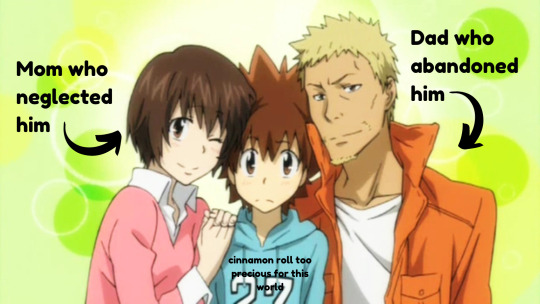
Iemitsu is considered a bad parent because Tsuna himself says so, and we gotta trust what the victim says. If Tsuna claims his father is a deadbeat father, than that's what his father is. Iemitsu might be a respected chief, an understanding mentor and a loving husband, there is no denying he fulfills those roles wonderfully well however, he falls short on his role as a father and that's the role Tsuna most needs out of him. Tsuna doesn't need his father to be a respected chief or an understanding mentor or a loving husband, he needs his father to be a father first and foremost. Instead, Iemitsu tells Nana to claim he was dead/missing. And she did (and I'll be coming back to this later). Now, not only did Tsuna have to live with the fact that his father up and left the house, he had to live with the fact that his father was also, very likely, dead.
Iemitsu-father was dead to Tsuna for two years, the boy had definitely come to terms with it by the start of the series. Except, Iemitsu wasn't dead at all. While it's treated as a comedy skit in the manga, the absolute rollercoaster of emotion Tsuna must have felt at that moment is unimaginable. "I lived with my mom and dad but then my dad started leaving for work until one day he stopped coming home, and then my mom told he was missing but he actually wasn't... oh, and he involved me in some dangerous mafia business", try explaining that to a therapist.
Offenses committed by Iemitsu:
Leave his son without an explanation while his son was at a vulnerable age (Tsuna was at least old enough to remember his dad leaving the house)
Telling his wife to write him off as dead/missing because "It's more romantic that way" (I haven't seen the episode in years but I just checked and that's exactly what he said, wtf)
Appearing in his son's life after being "dead" for years without a reasonable explanation (and no, claiming that he was doing that to protect his family is not an explanation, that's an excuse)
Appearing in his son's life only after he got said son involved in the mafia business
Disappearing as soon as everything is over and not being heard of again until he wants to
Acting like a father when he killed that role himself
I can understand the first offense, after all, Tsuna was a small boy when Iemitsu left. "You were a child, there was no need for you to know" is something adults repeatedly say when they refuse to elaborate on why they kept a child in the dark; and that's something I understand, I don't condone it but I do understand it. But Tsuna was clearly at an age where he could remember his dad leaving, he was at an age where he was emotionally grown-up enough to see his father leaving the house as being the same as being abandoned.
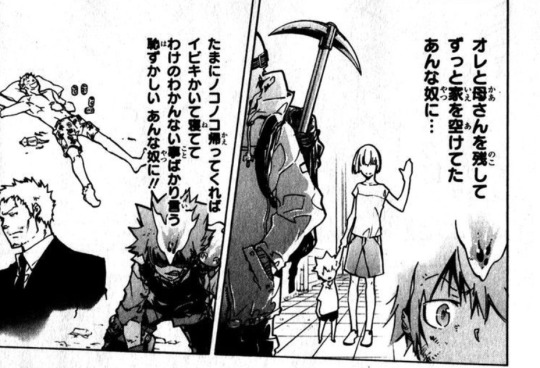
ツナ 「オレと母さんを残して ずっと家を空けてたあんな奴に・・・」
Tsuna uses the word 残す (nokosu) which means "to leave (behind)", which often carries a sense of forgetfulness, as though the act of leaving something behind was done because the person forgot about. "He left behind my mom and me" = "He forgot about us and left". And then he goes on to say "That guy (derogative) was always away from home", which further drives the point that Tsuna has some strong resentment towards his father for leaving without being heard of.
The second offense is, in my humble opinion, bullshit. The japanese use this particular word 「ロマン」 (roman) which is many times translated as "romantic", but which is used to describe a feeling of "pursuing impossible dreams or ideals which deeply define a character". This particular word is mostly used by japanese men to describe a feeling of longing for impossible dreams and ideals that women just cannot understand.
.
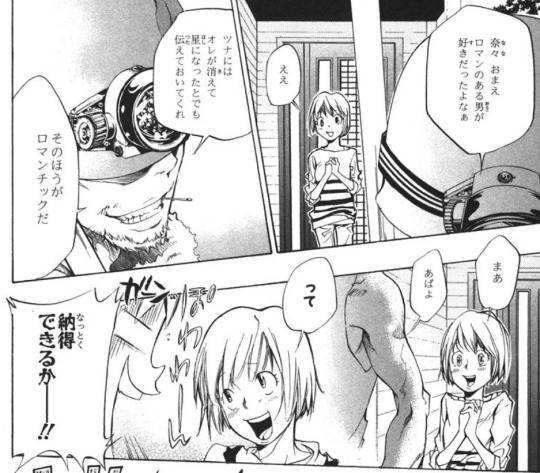
.
See what I mean?
Nana (I'm coming for you so sit tight) is so japanese in her essence that she's a woman who is attracted by the idea of a man chasing his impossible dreams (a man who is living the roman), and Iemitsu feeds on that by telling her to write him off as gone and "as becoming one with the stars", because that's more romantic than telling your kid his dad will be doing construction work. A husband and a wife who very obviously love each other and who both think living by their ideals is a much higher priority than their responsibility towards the child they brought into the world. The third offense shows how different Iemitsu and Tsuna are. Iemitsu claims he was keeping his family in the dark because that was how he protected them (through ignorance), and that's bullshit and Tsuna shows us exactly why, like a 100 or so chapters later. During the Future Arc, Tsuna was made to choice between telling his friends the whole truth or keeping them in the dark for their own safety (like Iemitsu). Tsuna decides to say the truth, because he knows what it means and what it feels like to be kept in the dark, especially regarding something that concerns the person directly. Tsuna made that decision because he had been in a similar position.
The fourth offense is perhaps there to show how incapable of being a father Iemitsu is. Iemitsu reappears in Tsuna's life only after Tsuna becomes involved with the mafia, because that's what Iemitsu is good at: the mafia. Perhaps Iemitsu was more involved in the mafia than he was in a normal family situation, which is why he lacks as a father, because he very simply doesn't know how to be a father. He can train, mentor and support Tsuna in the mafia way because that's what he knows how to do, however, that's not what Tsuna needs nor wants. Tsuna needed a father, but that father wrote himself off (so Tsuna unknowingly got another father and this one refuses to leave him alone) and Tsuna had to come to terms with the fact that he didn't have a father to depend on. And that's where the conflict between Tsuna and Iemitsu comes from: Iemitsu trying to act like a dad to the son he had educated to think of him as dead.
To Tsuna the situation must be something like this: his dad gave him up for adoption and now keeps coming back, trying to act like a dad because now the two of them shared the same hobby.
Sorry, Iemitsu, Tsuna found himself a better dad! Although you succeeded in ruining the dad-role for him, so now he's left with some complicated feelings towards Reborn, whom he sees as a figure he can depend on but whom he cannot call "dad" in fear it might end up like it did with you.
His fifth offense ties in with his fourth. Iemitsu only appears when there is something about the mafia going on and then disappears as soon as the situation is no longer related to the mafia. He only tries to act like a father to Tsuna when the mafia is involved, and that is absolute bullshit because that boy needs a father even outside of the mafia.
And finally his last and most important offense: how Iemitsu killed the image of a father in Tsuna's head.
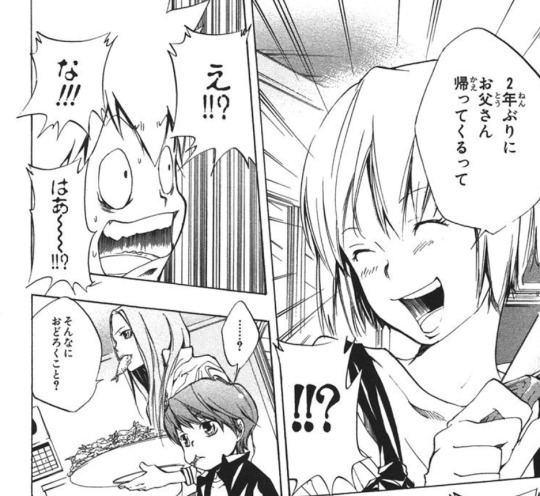
At hearing the news that his father will be back home, after 2 years, Tsuna's shocked reaction is treated more as a joke than a legitimate emotion someone might have towards the sudden undeadness of a father. Nana, his own mother, even goes as far as belittling him and his intelligence when she says (more explicitly in the anime): "Aww Tsuna, you actually believed that story about his disappearance?" and then "How do you think we pay for your school expenses and food, if he were really gone?"
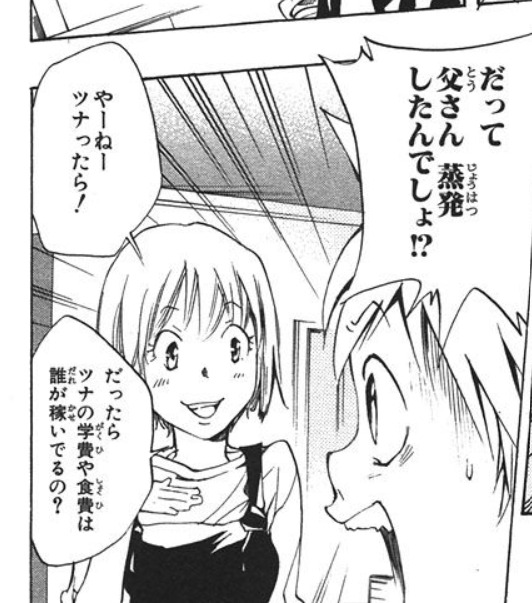
Iemitsu intentionally killed the existence known as "dad" in Tsuna's head, and Nana helped. Tsuna started the series convinced he no longer had a dad, which is why he ended up depending on Reborn, because Reborn was the first authoritative figure that called him a loser to his face while also believing Tsuna was much more than that. Reborn appeared exactly as the kind of figure Tsuna didn't know he needed in his life.
Though both Reborn and Iemitsu are there because of the mafia, Reborn stays for more than just the mafia, and Tsuna can see that. Iemitsu only interacts with Tsuna when the mafia is involved, while Reborn is there for him regardless of whether or not the mafia is involved. Reborn was sent there to make Tsuna the next boss, yet all Reborn did was make this loser of a kid get some confidence in himself and make some friends. Between a tutor whose intentions he knows (he's there to make him boss but somehow he's also trying to make him into a better person) and a dad whose intentions he doesn't know (he tries to teach him this mafia thing he really doesn't want to be involved in), Tsuna's heart chose the one figure he didn't know he always wanted in his life.
Nice going, Tsuna!
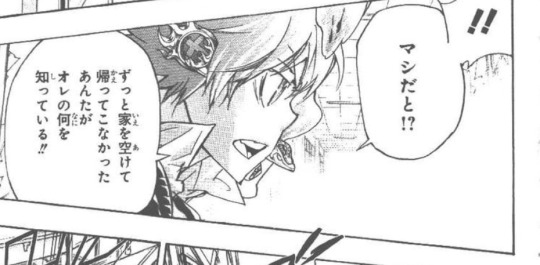
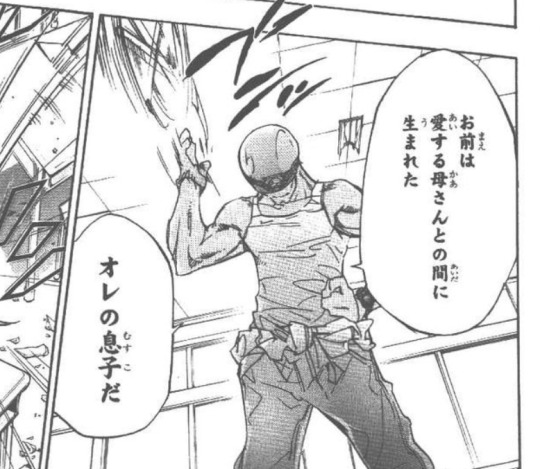
I bring this conversation between Tsuna and Iemitsu, which I think further shows the conflict between them.
ツナ 「帰ってこなかったあんたが オレの何が知っている!!」
家光 「お前は愛する母さんとの間に生まれた 俺の息子だ」
Tsuna: "What could you possibly understand about me?! If you're never home!" Iemitsu: "You are my son, born between me and the woman I love."
In what is a typical parent cliche, Iemitsu claims he knows Tsuna solely based on the fact that Tsuna is his son. This is a psychological trap which many parents seem to fall for: a belief that they will always know their children best because it is their children (and that their children might not know themselves because they are still children). Iemitsu fails to acknowledge that Tsuna is his own person and that he might not want to live by his ideals. As to why parents do this? Well, ego, most likely. A parent thinks themselves a god because they created a child, and refuse to acknowledge the fact that their child is just another person they will have to learn to know.
Now, Sawada Nana. The amount of information on this woman is so little that she might as well be of little influence to the plot, expect she's not!
Let's start from the beginning. Nana is described as being kind, but her kindness seems to only go so far, as she will and does ignore things she does not want to deal with. Reborn kicks her son in front of her? She leaves them alone. Her son keeps coming home with mysterious injuries? She ignores it.
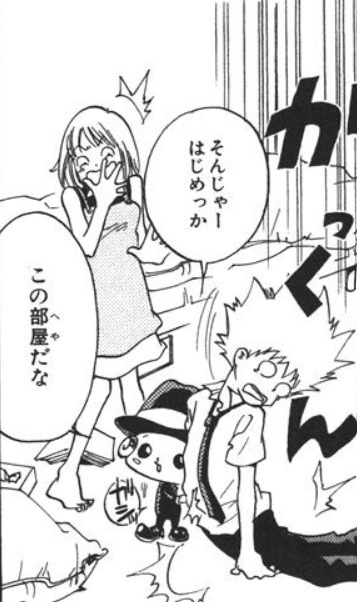
Again, all of these are treated as comedy, and Nana is just like any other anime/manga mother. She appears as a 1-dimensional character with no other role than to be there for every other character that isn't her son.
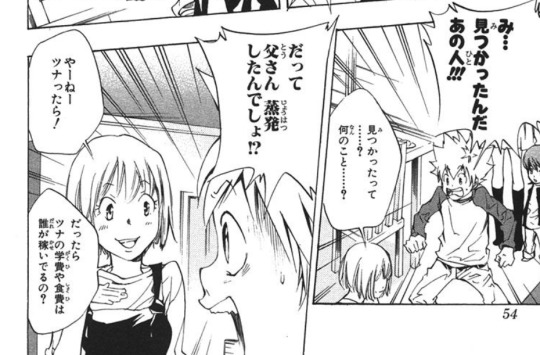
Nana, like Iemitsu, does the bare minimum for Tsuna as a mother. She does provide him with meals and a roof, however she completely neglects the emotional support the boy very obviously needs. There are instances in which she even belittles his feelings (such as when Tsuna was freaking out over his father's appearance and she proceeded to laugh and point out his naiveness at believing her lie).
What kind of freaking mother makes fun of their son for believing something they said?
Certainly not a good one!
And lastly, it was Nana who allowed and helped Iemitsu in being a bad father. Tsuna holds his mother in high respect because he believes Iemitsu abandoned her too, and that is why it is easier for him to forgive her and not his father. However, it was through Nana's emotional neglect that Iemitsu ended up ruining the image of a father in Tsuna's head — her passiveness is what allowed Tsuna to grow into the weak-willed character we meet in the beginning of the series.
In conclusion, both Iemitsu and Nana are to blame for Tsuna's loser behavior. So, if we're gonna talk about how bad of a father Iemitsu is, we should acknowledge the fact that Tsuna has a mother who allowed all of that to happen.
You're welcome to step up and shoot me, I'm open to constructive criticism!
#khr#katekyo hitman reborn#sawada iemitsu#tsunayoshi sawada#sawada nana#sawada family#khr reborn#khr characters#khr rant#khr iemitsu#khr nana#this took a lot longer than I thought#mini rant#manga panel
159 notes
·
View notes
Text
LET'S ENJOY GREEK MYTH RETELLINGS AND STORIES BUT NOT TAKE ALL OF THEM SERIOUSLY
You know, I really have to say this.
I don't think that Greeks, Hellenistic Pagans and other people who know Greek Mythology would be as frustrated as they are today if people DIDN'T TAKE MODERN SOURCES DEPICTING GREEK MEDIA AS ALWAYS ACCURATE.
Bear with me now.
All right, so, we all know about Percy Jackson.
And PJO was basically the Greek God make or break of its time and it broke the Greek Gods. Greeks and Hellenistic Pagans had the unfortunate experience of being bombarded with false, incorrect interpretations and thoughts about their deities.
And we have to remember here that to these Hellenistic Pagans, their gods are as sacred to them as God is to Christians. Maybe they wouldn't kill people over their gods, an added bonus, but we must respect the fact that they worship the gods and we must be respectful of Greek Gods when interacting with them.
See, I'm not saying that you can't be lighthearted. You can joke around and all that-it's just that actually hating and condemning the Greek Gods shouldn't be done when you're interacting with their worshippers.
Now that I'm done with that, well, Rick Riordan fucked up with Greek Mythology big time. Making Athena have children, HIS MISOGYNY. THERE ARE ENTIRE TAGS DEDICATED TO RICK'S MISOGYNY, NOT JUST OF HIS FEMALE CHARACTERS BUT OF ACTUAL ANCIENT GREEK GODDESSES. If I did a whole essay on his misogyny, I'd have to make multiple posts.
Rick done fucked up with them. I do not have to be the first person to tell you that.
HOWEVER, I am obligated to say that any author is freely able to portray the Greek Gods as they want (unfortunately at times).
And so Rick is free to interpret them how he likes.
Let's also remember that Rick thought terribly of the Gods and their worshippers when he was writing Percy Jackson and the other series.
Of course, he HAS changed for the better. Now he's more respectful of Pagans and has apologised, which is nice, but I just thought I'd let you know.
See, now we can accept and criticise Rick's writing, but before-
Well, before, it was absolutely awful for Greeks and Hellenistic Pagans. I mean, it's still awful, but it was more awful back then because almost nobody criticised Percy Jackson about depicting Greek Gods terribly. Everyone said that Greek Gods were American and belonged to America-ugh, that was horrible. It's absolutely appalling to do that, no less to Greeks themselves. People ranted about how horrible the gods were.
And I mean yes, the Greek Gods could be awful by modern standards, but we need to remember two things-
The Greek Gods were based on an ANCIENT SOCIETY with DIFFERENT MORAL STANDARDS. Judging them by modern moral standards isn't going to do anything.
The actions of the gods were SYMBOLIC, NOT LITERAL.
a) Artemis' cruelty towards humans? That's the cruelty of nature towards him. Artemis was a nature goddess and she hunted and resided in the wild.
b) Dionysus being kind and charming but also mad and ruthless at times? Well, that's what wine does. It can make people funny and charming to a point, but it also drives people mad and makes them violent.
c) Hades kidnapping Persephone? Well, Hades represents death, and that's what death does-it rips children from their parents' arms. Also, it signifies the fact that daughters and mothers did not have a say in their marriage, the father could give the girl away to any man in those times. Demeter actually being able to get Persephone back was a comfort to grieving mothers.
d) Zeus cheating on Hera multiple times?
There are multiple explanations for this one.
First, kings and princes often claimed to be descendants of Zeus, so Zeus was said to have many affairs with royal mortal women so that their claims to divine lineage could be accurate.
Second, Zeus' rain represented fecundity and fertility. As I said above, the actions of the gods are symbolic and they represent their domains, so he had multiple affairs and loads of children to signify his fertility.
Third, the Greek Gods were based on Ancient Greek society where multiple men took concubines and lovers. And Zeus did this too, because he was a king!
e) Hera punishing the lovers and bastards? That's what queens did to some concubines for revenge, since they couldn't take it out on the king.
It's all either symbolic or based on Ancient Greece. The gods that humanity created were based on those times, and they were created millennia ago, when things were different in nearly every way possible.
Anyway, what I'm trying to tell you is that we're allowed to have fun with these stories and retellings that include Greek Mythology, but if you really want correct information on Greek gods, go and read the myths and the compositions of Ancient Greek poets and playwrights (Homer, Hesiod, etc).
Because many people, when reading these modern retellings and the like, think that they are actually real mythological information and accordingly spew nonsense.
People call Apollo 'Asspollo' and harass his worshippers because of one incorrect comic that came out in 2018. Apollo never raped Persephone.
And people also view famous figures like Odysseus and Achilles incorrectly because of incorrect translations that don't correctly capture the original and CERTAIN RETELLINGS (cough-Madeline Miller-COUGH)
And there are so many more examples I could give, but then this would be too long to post.
See, it's not that the writers completely rip the original lore out. They keep a lot of it, but they also add in some incorrect information. And sometimes this isn't that bad or malicious, it's just incorrect.
So if you're not sure about whether something in a retelling or story depicting Greek Gods is true, you should search it up online or ask someone who knows.
Because Greeks and Hellenistic Pagans are constantly frustrated at how their gods are portrayed and that everyone just takes the retellings as mythologically correct.
TLDR Greek mythology retellings can be fun for you to read but don't take all of the info in them as mythologically correct. You can be lighthearted about the Greek Gods but please don't actually loathe or mock them with others who believe in them and worship them. If you're not sure about info in a retelling or story, then search it up or ask someone you know.
There are multiple blogs on tumblr who can tell you more information about the actual Greek Gods and they're pretty nice about it too, so don't be too afraid.
#rr crit#pjo critical#pjo#pjo crit#percy jackson critical#percy jackson#rr critical#pjo discourse#rick riordan critical#percy jackson crit#PJO meta#Lore Olympus critical#LO critical#anti percy jackson#anti rr#anti rick riordan#Greek Gods#Greek Mythology#Anti tsoa#Anti Madeline Miller#Achilles#Odysseus
42 notes
·
View notes
Note
Thoughts on Sanji enjoying feminine things?
short thoughts: i love it and think he should do it more often esp because i feel like he definitely does in canon and just won't actually let himself do so. i don't draw him in drag all the time for no reason
long thoughts: [breathes in]
i could write an entire essay on sanji's character in terms of femininity, queerness, and misogny BUT we don't have time for all that so let's just focus on the fact i feel like there's actual evidence he enjoys traditionally non-masculine things and oda actually puts him in situations to highlight this pretty frequently
-i am guilty of calling sanji a metrosexual . it's a stupid word but it fits him. he's the only guy on the ship that showers every day and the only other ppl on the ship who do this are the two girls. man also wears suits like mad and has a fairly...daring fashion sense outside of that (granted, most ppl in one piece do.) but he just cares about these things more than most guys! and that doesn't even seem like something that came from his upbringing at baratie bc...no one else dressed like that. he just does that himself. i also can't stop thinking about the sbs where someone suggested sanji would be a stylist in real life and oda went "yes agreed"
-the kamabakka moment...okay terribly offensive and transmisogynistic (won't get into it bc i have several times before) BUT if we can take one thing from that it's that sanji *did* dress up in makeup and a dress and like. frolic with the okama. it's framed as "against his will" but he definitely could have torn that shit off quickly and easily enough, yet oda decided to imply sanji enjoyed it for at least a time before he chickened back out and called the place hell for 2 years. yea, it was probably for oda's idea of 'comedic effect' but this is, once again, one piece. sometimes the humor is part of the plot. sometimes very real information is given through the guise of humor. going off of this u could mention that (also offensive but meant to be funny) joke with the blood donation scene from fishman island
-idk just something about the way oda writes him fighting lots of queer or non-conventionally masculine characters. i feel like it says something about sanji having his own internal struggle about his masculinity- which we know must be true bc of his whole list of virtues he never breaks a la women because of his upbringing with good ol' fashioned zeff and uh. "men should be war machines" germa over here. he fights bon clay and queen for christ sake.
-the scene where he's like happy as a clam to be in nami's body in punk hazard is another comedy gag that's also a little . interesting. I could say oda just keeps accidentally coding him but I feel like oda's very intentionally with his characterization and the subtlety of it
-overall he's just clearly so interested in masculinity since zeff raised him to be that way and he holds zeff in such high regards in combination with his background with germa, his mother and his sister, leading to a I Have To Be A Perfect Gentlemen And Also Respect Women by Putting Them On the Highest of Pedestals. and this in turn has made him reluctant to engage with femininity in any way that could be perceived as Not fitting this manly persona he's made for himself, yet he keeps getting put up against it in various small moments in the series whether comedic or not. I don't think oda frames sanji's relationship with masculinity entirely as a character flaw or weakness to be fixed, bc oda seems to respect sanji's views/they align with oda's own views. BUT I do think he knows it's partially susceptible to change and....he makes Sanji encounter these things so often for a reason. does that make sense?
in my ideal world sanji 20 years in the future is a bit more feminine even if he's still a casanova ladies man. like he accepted the okama influence in his life, he's just more quiet about it, lmao. I mean did u see his hair for oda's 40 yr old design
so yeah. he does, I think. quietly and deep down.
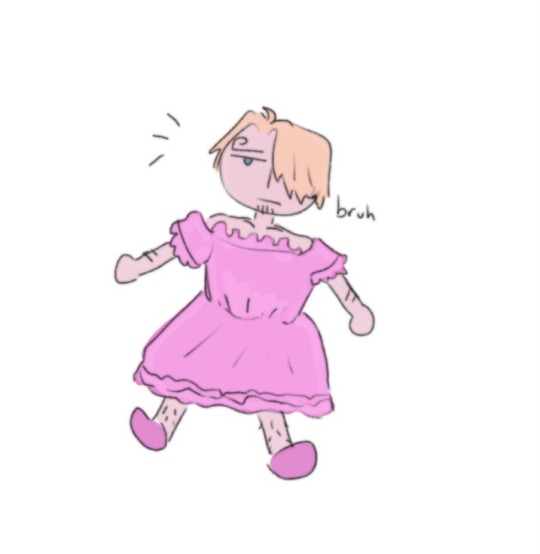
#asks#replies#one piece#sanji#i probably forgot more but . u get the point. he has certain subtext that i enjoy even tho it's infuriating to watch him sometimes#sanji does a lot of sterotypically feminine behaviors too in his swooning and emotional outburts and running from spiders but#thats only partially related .#its funny comparing him to franky who is seen as super manly [even engaging with señor pink in the Manliness Fight]#and yet franky is seen as more manly bc of how he looks and acts even tho he 1. wears a speedo everywhere 2. wheres pigtails and braids#3. bawls at anything that moves
53 notes
·
View notes
Text
EXTERNAL INFLUENCES IN DUNGEON MESHI: INDIAN PHILOSOPHY
(SPOILERS FOR DUNGEON MESHI BELOW)
We know that Ryoko Kui spent considerable time at the beginning of working on Dungeon Meshi doing research and planning the series. Kui constantly references real world culture, history and mythology, but she also occasionally references real-world philosophy.
The story of Dungeon Meshi is full of philosophical questions about the joy and privilege of being alive, the inevitability of death and loss, the importance of taking care of yourself and your loved ones, and the purpose and true nature of desire. Kui explores these issues through the plot, the characters, and even the fundamental building blocks that make up her fictional fantasy world. Though it’s impossible to say without Kui making a statement on the issue, I believe Dungeon Meshi reflects many elements of ancient Indian philosophy and religion.
It’s possible that Kui just finds these ideas interesting to write about, but doesn’t have any personal affiliation with either religion, however I would not be at all surprised if I learned that Kui is a Buddhist, or has personal experience with Buddhism, since it’s one of the major religions in Japan.
I could write many essays trying to explain these extremely complex concepts, and I know that my understanding of them is imperfect, but I’ll do my best to explain them in as simple a way as possible to illustrate how these ideas may have influenced Kui’s work.
HINDUISM
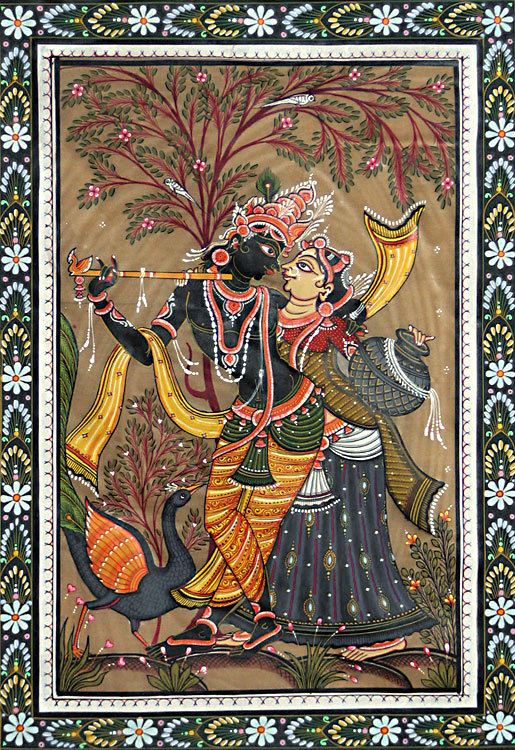
Hinduism is the third-largest religion in the world and originates in India. The term Hinduism is a huge umbrella that encompasses many diverse systems of thought, but they have some shared theological elements, and share many ancient texts and myths.
According to Classical Hindu belief, there are four core goals in human life, and they are the pursuit of dharma, artha, kama, and moksha.
Dharma is the natural order of the universe, and also one’s obligation to carry out their part in it. It is the pursuit and execution of one’s inherent nature and true calling, playing one’s role in the cosmic order.
Artha is the resources needed for an individual’s material well-being. A central premise of Hindu philosophy is that every person should live a joyous, pleasurable and fulfilling life, where every person's needs are acknowledged and fulfilled. A person's needs can only be fulfilled when sufficient means are available.
Kama is sensory, emotional, and aesthetic pleasure. Often misinterpreted to only mean “sexual desire”, kama is any kind of enjoyment derived from one or more of the five senses, including things like having sex, eating, listening to music, or admiring a painting. The pursuit of kama is considered an essential part of healthy human life, as long as it is in balance with the pursuit of the three other goals.
Moksha is peace, release, nirvana, and ultimate enlightenment. Moksha is freedom from ignorance through self-knowledge and true understanding of the universe, and the end of the inevitable suffering caused by the struggle of being alive. When one has reached true enlightenment, has nothing more to learn or understand about the universe, and has let go of all earthly desires, they have attained moksha, and they will not be reborn again. In Hinduism’s ancient texts, moksha is seen as achievable through the same techniques used to practice dharma, for example self-reflection and self-control. Moksha is sometimes described as self-discipline that is so perfect that it becomes unconscious behavior.
The core conflict of Hinduism is the eternal struggle between the material and immaterial world. It is often said that all of the material world is “an illusion,” and what this means is that all good and bad things will inevitably end, because the material world is finite. On the one hand, this is sad, because everything good in life will one day cease to exist, but on the other hand, this is reassuring, because all of the bad things will eventually end as well, and if one can accept this, they will be at peace.
The central debate of Hinduism is, which is more important: Satisfying your needs as a living thing, having a good life as a productive member of society, serving yourself, your family, and the world by participating in it the way nature intended? Or is it rejecting desire and attachment, discovering the true nature of existence, realizing the impermanence of material things, and that one can only escape the suffering that comes from the struggle of life by accepting that death and loss are inevitable?
There is no set answer to this question, and most believers of Hinduism tend to strike a balance between the two extremes simply because that’s what happens when a person leads a normal, average life, however there are also those who believe that pursuing extremes will lead to ultimate enlightenment and final release as well.
BUDDHISM
Buddhism is an Indian religion and philosophical tradition that originated in the 5th century BCE, based on teachings attributed to religious teacher the Buddha. It is the world's fourth-largest religion and though it began in India, it has spread throughout all of Asia and has played a major role in Asian culture and spirituality, eventually spreading to the West beginning in the 20th century.
Buddhism is partially derived from the same worldview and philosophical belief system as Hinduism, and the main difference is that the Buddha taught that there is a “middle way” that all people should strive to attain, and that the excesses of asceticism (total self-denial) or hedonism (total self-indulgence) practiced by some Hindus could not lead a person to moksha/enlightenment/release from suffering.
Buddhism teaches that the primary source of suffering in life is caused by misperception or ignorance of two truths; nothing is permanent, and there is no individual self.
Buddhists believe that dukkha (suffering) is an innate characteristic of life, and it is manifested in trying to “have” or “keep” things, due to fear of loss and suffering. Dukkha is caused by desire. Dukkha can be ended by ceasing to feel desire through achieving enlightenment and understanding that everything is a temporary illusion.
There are many, many other differences between Hinduism and Buddhism, but these elements are the ones that I think are most relevant to Kui’s work.
Extreme hedonism involves seeking sensual pleasure without any limits. This could just be indulging in what people would consider “normal” pleasures, like food, sex, drugs and the arts, but it can also involve doing things which are considered socially repugnant, either literally or by taking part in symbolic rituals that represent these acts. Some examples are holding religious meetings in forbidden places, consuming forbidden substances (including human flesh), using human bones as tools, or engaging in sex with partners who are considered socially unacceptable (unclean, wrong gender, too young, too old, related to the practitioner). Again, these acts may be done literally or symbolically.
Extreme ascetic practices involve anything that torments the physical body, and some examples are meditation without breathing, the total suppression of bodily movement, refusing to lay down, tearing out the hair, going naked, wearing rough and painful clothing, laying on a mat of thorns, or starving oneself.
HOW THIS CONNECTS TO DUNGEON MESHI
Kui’s most emphasized message in Dungeon Meshi is that being alive is a fleeting, temporary experience that once lost, cannot truly be regained, and is therefore precious in its rarity. Kui also tells us that to be alive means to desire things, that one cannot exist without the other, that desire is essential for life. This reflects the four core goals of human life in Hinduism and Buddhism, but also could be a criticism of some aspects of these philosophies.
I think Kui’s story shows the logical functionality of the four core goals: only characters who properly take care of themselves, and who accept the risk of suffering are able to thrive and experience joy. I think Kui agrees with the Buddhist stance that neither extreme hedonism nor extreme self-denial can lead to enlightenment and ultimate bliss… But I also think that Kui may be saying that ultimate bliss is an illusion, and that the greatest bliss can only be found while a person is still alive, experiencing both loss and desire as a living being.
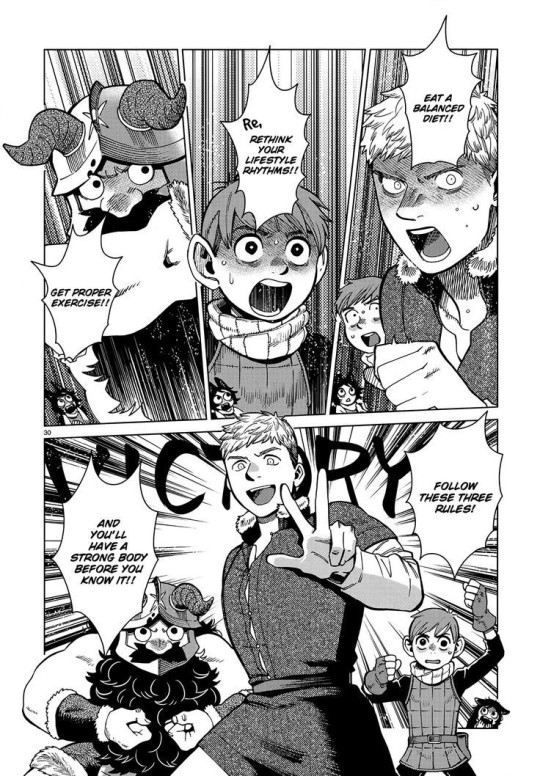
Kui tells us living things should strive to remain alive, no matter how difficult living may be sometimes, because taking part in life is inherently valuable. All joy and happiness comes from being alive and sharing that precious, limited life with the people around you, and knowing that happiness is finite and must be savored.
Dungeon Meshi tells us souls exist, but never tells us where they go or what happens after death. I think this is very intentional, because Kui doesn’t want readers to think that the characters can just give up and be happy in their next life, or in an afterlife.
There is resurrection in Dungeon Meshi, but thematically there are really no true “second chances.” Although in-universe society views revival as an unambiguous good and moral imperative, Kui repeatedly reminds us of its unnatural and dangerous nature. Although reviving Falin is a central goal of the story, it is only when Laios and Marcille are able to let go of her that the revival finally works… And after the manga’s ending, Kui tells us Falin leaves Laios and Marcille behind to travel the world alone, which essentially makes her dead to them anyway, since she is absent from their lives.
At the same time, Kui tells us that trying to prevent death, or avoid all suffering and loss is a foolish quest that will never end in happiness, because loss and suffering are inevitable and must someday be endured as part of the cycle of life. Happiness cannot exist without suffering, just like the joy of eating requires the existence of hunger, and even starvation.
Kui equates eating with desire itself, using it as a metaphor to describe anything a living creature might want, Kui also views the literal act of eating as the deepest, most fundamental desire of a living thing, the desire that all other desires are built on top of. If a living thing doesn’t eat, it will not have the energy necessary to engage with any other part of life. Toshiro, Mithrun, and Kabru are all examples of this in the story: They don’t take care of themselves and they actively avoid eating, and as a result they suffer from weakness, and struggle to realize their other desires.
Kui suggests that the key difference between being alive or dead is whether or not someone experiences desire. If you are alive, even if you feel empty and cannot identify your desires like Mithrun, you still have desires because you would be dead without them. The living body desires to breathe, to eat, to sleep, even if a person has become numb, or rejected those desires either to punish themselves, or out of a lack of self-love.
Sometimes, we have to do things which are painful and unpleasant, in order to enjoy the good things that make us happy. I believe Kui is telling us that giving up, falling into despair, and refusing to participate in life is not a viable solution either.
The demon only learns to experience desire by entering into and existing in the material, finite world. This experience intoxicates the demon, and it becomes addicted to feeling both the suffering of desire, and the satisfaction of having it fulfilled. This unnatural situation is what endangers the Dungeon Meshi world, and it’s only by purging the demon of this ability to desire that the world can be saved. The demon is like a corrupted Buddha that must give up its desires in order to return to the peaceful existence it had before it was corrupted.
The demon curses Laios to never achieve his greatest desires at the end of the manga, which manifests in several ways, such as losing his monstrous form, Falin choosing to leave after she’s revived, and being unable to get close to monsters because they are afraid of him. In some ways you could compare Laios to a Bodhisattva, a person who tries to aid others in finding nirvana/moksha, even if it prolongs their own suffering and prevents them from finding personal release. Laios gives the demon peace, but Laios himself will never be able to satisfy his desires, and must eventually come to accept his loss and move on with his life.
(This is an excerpt from Chapter 3 of my Real World Cultural and Linguistic influences in Dungeon Meshi essay.)
#dungeon meshi#delicious in dungeon#the winged lion#dungeon meshi spoilers#laios touden#mithrun of the house of kerensil#analysis#The Essay#After all the conversation about Mithrun I felt it was really important to drop this excerpt today
157 notes
·
View notes
Text
I'm not the best writer when it comes to writing convincing essays or whatever, but I'm going to give this a go because it's something that I've thought for a long time that I've never seen anyone really acknowledge unless I bring it up first. (also I am sick and don't really want to do much editing here, just rambles, so good luck)
I think that when most (not all, but most) people get salty about 'modern art', they are not salty about the things people think they are salty about. When they say "this isn't art", theres an important bit that they're not articulating. What I think most of them mean is "this isn't art that should be in a museum." "this isn't art that should cost this much" "this isn't art that should be getting this kind of recognition". And there is a huge difference between that and just saying "this isn't art"
Firstly, all of the arguments about why modern art is in fact art straight up....don't apply. They don't address the problem, they don't answer the question. This isn't really anyone's fault per se, given that it is addressing the literal statement, it's just I think most people aren't actually thinking that literal statement.
So then what do they really mean? Like I said, I think they're trying to articulate why they're frustrated that this art is in a museum when "they could do it". So when you say "okay then, you do it" that doesn't address the core issue, which is "but why is this getting recognition for it, and I would get none" because yes, unless they are famous, they would get Zero recognition for it. Nobody would be lining up to buy their art, no one would ask to put it in a museum. Best place they can hope to have this displayed is a fridge door.
When you look at a piece of fine art, most can see the amount of effort put into it. They see how much training it took to get there, they see how much time it took to put those strokes on that canvas and they can go "yeah, that took skill, that took effort, not everyone can do that. it deserves recognition". And a lot of modern art does take skill, it's just skill that isn't easily noticeable to the average viewer, such as rothko's color fields, they do take a lot of skill and effort, you just can't see it if you don't know. But a lot of modern art that people complain about isn't something that has skill that's not recognized, it just requires very little technical skill at all (not a condemnation, btw).
When you're talking about something 'anyone can do' that piece's value is often not a recognition of skill, or even of the message, it's a recognition of a name. It's similar to having a gucci bag because it's a gucci bag, not because you care remotely about the bag. Yes, art isn't displayed because of how much effort went into it, but it's a huge industry that many many people are making money through from sheer name recognition alone.
Like that one painting of that one artist's (I forget which artist and my cursory google isnt finding it, but also its just an example) where it got replicated and sold to a bunch of people for a large amount of money so they could all have something that had a small chance of being a genuine painting by the artist, that's an excellent example of the fact that a lot of the gallery-level art world is Entirely about the name, not about the piece itself. If someone just made that painting but didn't say it could be from the artist, then who cares?
If you go to ringo starr's art website (https://www.ringostarrart.com/) then you can see that some of his work, especially his older work, is of that category of stuff that many people would say "I could do that" to. For instance, these two? 1,400 and 6,000 pounds respectively for a PRINT of these from his website


....okay this one I kinda enjoy.
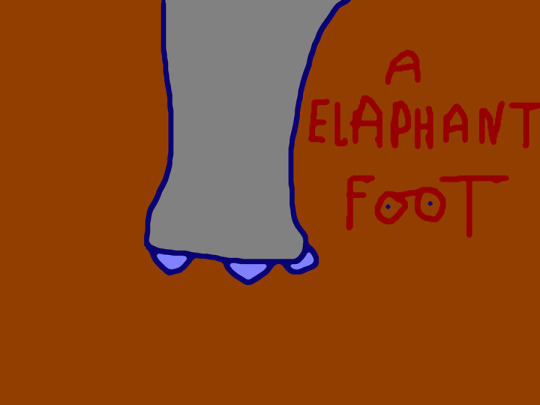
but still. 2,000 pounds for a print.
All of this is possible because he's ringo fucking starr, he can sell his paintings for whatever he wants. If I tried to sell those for that much, I'd be laughed out of the room. All of it is just clout, it's just how big your name is and how much you can use that as leverage.
This is not to say that other forms of art don't also have this issue, they do, especially with people devaluing creative works so much today. But you could probably get a few commissions if you sell realistic art or do commissions of people's characters, while you Cannot get any money trying to sell stuff like ringos art unless you already have an audience who will buy it.
This does somewhat lead into a discussion of how art curators pick which artists are 'good' somewhat arbitrarily, but that's a whole other post.
Doing art for 'yourself' vs for other people or money is also a whole other post, one which I've actually seen quite a lot on here. But suffice to say if your response to all of this is 'just make art for yourself! Why do you need recognition?' then maybe go find some of those posts. It's not bad to want recognition, and it's not bad to question why that guy is getting much more recognition for the exact same thing you're doing just because he has a bunch of rich friends who are able to host fancy parties and go 'hmm. yes this is good art.' (not that all modern artists had rich friends, but they did almost all get Extremely lucky in some shape or another that led to them now being widely accepted as good artists).
You cannot make a living off modern art unless you're well known, and if you happen to be well known already, you could likely make a living off modern art without having any experience, and that's what a lot of people hate about modern art, even if they don't articulate it. While some would, most wouldn't say "my five year old could do that" to someone's personal piece that they made themselves and hung up in their home, or that their friend made and gave to them. They say that about the pieces bought for thousands of dollars or millions of dollars.
And I don't want people to think that I do hate modern art, I don't (though this is tumblr, so I'm pissing on the poor just by writing this). I don't hate any of the famous modern artists, I don't think modern art isn't art. I do hate the industry that says their art is suddenly worth something just because some rich fuckers somewhere decided they should be, and anything I tried to do in a similar vein, original or not, would be better suited to sit in a coffee shop and continuously marked down and never sold.
So next time you say "so why don't you make it", maybe ask yourself if you would buy it.
357 notes
·
View notes
Text
Stobin Different First Meeting AU where they go to prom together. This was meant to be an au post and turned into a mini fic oops (written completely within a tumblr post so sorry for the poor quality)
(edit: realized I should link the fic I was inspired by for those who don't follow me and so didn't see me reblog it earlier)
Steve doesn't necessarily want to go to prom, right? Like yeah, he'd been imagining it for a while, but now that he was very, very single it just didn't have the same shine that it used to. And he really wasn't ready to start dating yet. However, he didn't want to just, not go to prom, and also knew it would seem really weird (and pretty fucking sad) if he didn't go.
Which leaves him in a conundrum.
He thought for a while that maybe he would go with one of the junior cheerleaders. While he didn't have any close friends anymore, he was still friendly with plenty of people. There were girls that wouldn't be going to prom unless they had a senior boyfriend - some he had even gone on dates with in the past who wouldn't think a single prom date meant that he wanted a new girlfriend.
However, he is pretty sure most of those girls would have... other expectations for the night. And honestly? He isn't quite sure that he was ready to get back on that horse either.
... Not that he thought women were horses.
He's pretty sure men are normally the ones called horses in riding metaphors.
Anyway.
That left him stuck. He couldn't just not go to prom, but also didn't want to wind up trapped on an actual date with someone. So who could he ask?
His solution ended up coming from an odd place.
Robin Buckley was... quite honestly, kind of a weirdo.
She was cute, in an alternative sort of way. She never took any of his shit (he wasn't completely sure she even liked him) but also reluctantly laughed at the snarky shit he said under his breath during their Film History class. And not in the fake giggly way girls did when they were flirting, but didn't actually care about what he was saying, just the way he said it. She actually seemed to think he was funny. Even if that revelation seemed to piss her off.
The only reason he was even in Film History that semester - and therefore, knew who she was - was for the easy A. He got to watch movies in class, and watch movies for homework. He was willing to plow through a couple of shitty essays in exchange for a class that he didn't feel like a complete idiot in.
(Well, he was pretty sure Robin thought he was an idiot about movies, but just because he had trouble remembering the names and shit of characters, didn't mean he couldn't analyze the themes, fuck you very much, Buckley.)
They had gotten assigned a project together early on, and it hadn't been completely terrible. She had quickly taken over doing most of the writing portions, but hadn't thought all of his ideas were terrible. By the end of the project he thought they were even sort of having fun together.
He'd always been one to try his luck, take a little more than he was given. So, after that assignment was over, he started sitting next to her in class, not wanting that easy, if sharp, camaraderie to end. Robin rolled her eyes at him and asked him what he thought he was doing the first time he did it, but she never sent him away.
They ended up chatting more and more during down times, passing notes to each other and sharing sly comments under their breaths during the movies. Steve often had trouble paying attention at school, his mind easily wandering away, and it was almost as bad during most movies, but Robin helped keep him on track.
The class turned into one that was done for the easy grade, a last ditch effort to improve his already hopeless GPA, and became one he actually enjoyed.
The more he thought about it, the more he liked the idea of going to prom with Robin. It made the night seem a little less unbearable.
He thought about making a big deal out of asking her, because he knows that's what girls (and even Nancy) had enjoyed for past dances. He quickly scrapped that idea, however, because not only did he not want to put pressure on her like that, but also she seemed to hate public spectacles like that.
Or at least when aimed at her, they both enjoyed watching drama unfold in the halls a bit too much to say she hated it completely.
So Steve waits until the end of the day, their film class being their last, to pull her into an empty classroom. She follows him without question in a show of trust he didn't realize she had in him. The notion warms him, and for some reason makes it more difficult to get the question out.
"Why do I feel like you're about to try to sell me drugs or something?" Robin asked, raising an eyebrow at him. He squints at her in offense.
"Why is that your first assumption?!"
"I don't know! Why else are you pulling me out of the hallway all secretive like, making sure no one followed us, into an abandoned classroom," she asks, throwing her arms into the air.
"The classroom isn't abandoned, it's the end of the day! Also, who does drug deals on campus, that's just stupid?" He asks rhetorically, before waving one hand through the air, as if trying to erase the current thread of conversation. "That doesn't matter, you're distracting me."
"Well then, get on with it! Some of us have practice we need to get to."
"It's like talking to the kids," he mutters to himself, "Whatever. I wanted to ask - will you go to prom with me?"
That stops Robin up short. There's panic in her eyes now, though Steve isn't sure what exactly put it there. Was his reputation that bad that even band geeks are terrified of getting asked out by him?
"You want to go on a date? With me?" she asks slowly, disbelief coloring her voice, though it doesn't hide her unease.
"No, I want to go to prom with you," he scoffs, "Not go on a date with you."
"That is a date, dingus! The person you go to prom with is literally called your date!"
"Okay, sure, maybe, but I don't actually want to date you," he said, rolling his eyes at her.
Like, okay, he understood his reputation for being... what did she call him last week? A 'huge effing rake'? But that didn't mean that he was trying to date any girl that looked in his direction. A lot of girls looked in his direction. That was too many women, even for him.
Robin relaxes a little at that.
"Then why are you asking me to prom instead of someone you actually want to date?"
"Because!" he says, resisting the urge to flail his hands back at her. "I don't want to date anyone right now. Most people I ask are going to expect all these things from me - they're going to want dinner, and at the very least a kiss at the end of the night if not more, or another date the very next day. Because Steve Harrington is supposed to want those things!" He takes a deep breath and runs a hand through his hair to calm himself. "But right now? I really don't."
"Well then, what does Steve the Hair Harrington actually want?" She had relaxed fully at this point, a smile playing at the corner of her mouth.
"I want to go to prom with someone I consider a friend, someone who makes me laugh," he says after a moment of silence. "I want to dance badly to really corny pop music and drink just enough spiked punch that I don't remember how much I hate wearing any sort of tie. Then I want to go get milkshakes or go see a really trashy midnight horror flick, just because I'm having so much fun I don't want the night to end."
That small smile has grown into a reluctant grin on Robin's face. It makes her eyes shine and her freckles pop. Steve thought that if he was in a better place, if they had met at a different time, he could have fallen in love with her.
But they had met now instead, in some shitty public school elective course, and she was the closest thing he had to a friend that wasn't a snotty middle schooler.
"That sounds... like a lot of fun, actually," she says, mischief sparking on her face. "Who would've known the hidden depths hidden behind all that hair."
"Hey!" he protests half-heartedly, unable to keep a grin of his own off his face. "So what do you say? Wanna go to prom with me?"
"I guess," she sighs, acting like it was such a trial to go to prom with him. Him! But her next words make up for it. "Since we're friends, and all. However, I still expect you to buy me dinner, though you can keep the kiss goodnight to yourself."
Steve can't help the giddy laugh from spilling out of him. For the first time in weeks, he is actually looking forward to prom.
#stobin#platonic stobin#st fic rec#mini fic#steve#robin#my writing#writing tag#this was got out of hand#all of the stuff about prom is pulled loosely from my own experiences with prom#both from it being seniors only (juniors at my school had their own dance) to what people did after prom#(i went to two proms and one group went and saw a bad horror movie after prom and i went to a diner with the other group)#also this is barely editted so there is some weird tense switches in here im sorry!#this wasnt meant to be an actual fic i had just meant to throw out the idea of steve asking robin to his prom#and steves voice got away from me quick#this was inspired by the fic i reblogged earlier today about steve taking robin to her prom
517 notes
·
View notes
Text
how to not let your autistic inner child win (or how to write an if) by the secretary
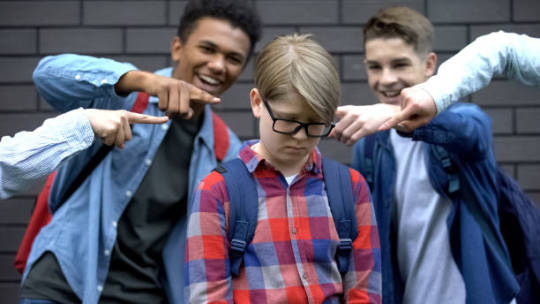
[id: a student with glasses being pointed at and mocked by two students on screens, and two more offscreen with only their arms showing. the central bullied student looks sad, and everyone else is laughing. end id]
Ruhoh, is this another secretary essay? Well, yes it is! The gender politics one will eventually come around when I feel like it, but this one, as the title suggest, is about how to write an IF. And since I'm presuming most of you are on the spectrum (or on a spectrum), it gets a little tongue-in-cheek.
hehe
Anyways, if you have autism, you have eternal swag. It's just true! But having so much swag makes it a problem when writing, or doing any sort of project. This is something I've noticed from people who don't have evil autism. Those not afflicted by the rare autism version of evil autism (my autism) will often be really bad at just... doing things - despite having all the abilities to do so! I think it might be a adhd thing or something too. Anyways, I love helping people, (this is my evil autism), and I'd like to share some girl tips on how to kill your inner child :)
I think something I've noticed from people making any sort goals- online, real life, job, working, etc - is it is straight forward. ie: I want to graduate from high school, I want to make a video game, I want to journal everyday. These are all achievable using your abilities that you learn and gain through your life, and failure doesn't exempt you from trying again. Thing is, this specific thing I just described (straightforward goals) is something I think a lot of autistic people struggle with.
I deeply remember sitting down in the corner of my high school, looking like the hottest girl who played pokemon on her ds when someone who had +1% more autism than me told me that, one day, he was going to make the most cool pokemon game ever where you could date other characters and have babies and have your children go on adventure too. As a 14 year old, I thought to myself 'bitch, shut up' but also, 'this is so unrealistic, but he really believes it, uh'. And he did! And you know, I think that's okay. I think it's okay to believe that you can make things that you cannot do at the moment - I mean that's just how life it. We didn't go on the Moon thinking we couldn't
But... the guy didnt know how to code, or how to make games, or how to program, or how to develop stories, or how to make art, etc etc etc. He didn't know these things, but he wanted to make these things. And I see this to a certain degree quite a bit when it comes to creation. I want to say: it's a very important of the process but simply one part.
I think being able to imagine what you could do if you have all the resources in the world, all the time, and all the help is important - but it is even more important to look within and go 'alright with all this in mind - what can I do?'
And if you're in the field of IF, well, what can you do? Coding, storytelling, character design, plotting arcs, etc. I think the skills can be learned by anybody (sidenote incoming)
If anybody ever fucking says that art is innate, they're fucking lying. It's a skill you grind out. You work it out. You work even if you feel not creative. You write words even if they don't come to you naturally. You draw even if the images can't be conjured. You work you work you work and you make something. You cannot always make art when feeling creative because you aren't always creative. you must be willing to die for your art, yes, but you must also be willing to create without any creative sparks! If you want to be an artist, you better work bitch.
(sidenote ending) and with that in mind, you need to develop restraints onto yourself. In IF, it's actually to create restraints, and here are some I suggest for all of my fellow autists who might struggle with them. I love you guys, truly, anyways. here they are:
restrain characters.
Make three characters + a main character. Write a couple of scenes with them. Is that your maximum? Is that too much? Go up and down until you find the right amount. You can add more character when your writing is better. Stick to a minimum per scene. If you have ideas for 30 characters, you can easily melt them into 10. Seriously. Put the heat on maximum and start creating new fun dolls to play with.
2. restrain scenes
You cannot write 500 per interaction. This is a bad idea because a) you might do the thing where you run out of creativity which you need to learn to do without but it is hard and b) interactions are time limited and time sensitive. not everybody will go through them. if you have a 30k update, but most people will only see 1k... are you really writing a game for them or for yourself? I made my wife do this format:

youll gain the ability to gauge if a scene is important or not eventually, I'm sure.
3. restrain area
I recommend writing like a murder novelist. You have a closed circle, and the player cannot leave it. they can only be within that space. That space that exists within that specific story is the only thing they have access to. it can be a school, a city, a bedroom - but its limited. you create setpieces that players interact with. some set pieces are the same with just a different coat of paint on.
anyways, i believe in dreaming big, but i also believe that we have little time on our hands to create. when wanting to make something, restraint yourself. its always way more fun to find ways to break out of our bonds then just roaming free, right? I mean... maybe not. I'm not your mother, you know.
65 notes
·
View notes